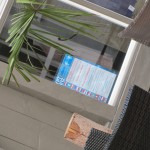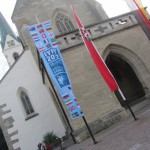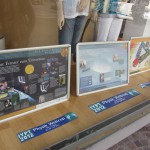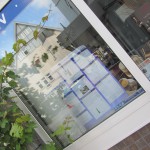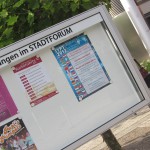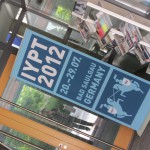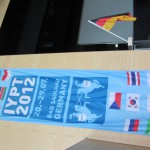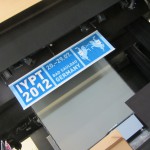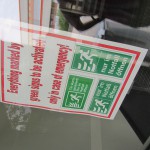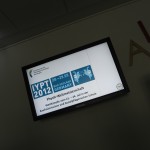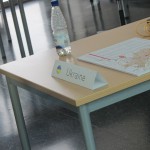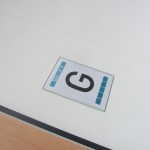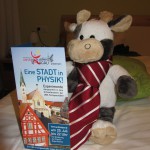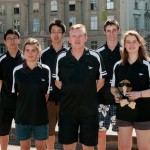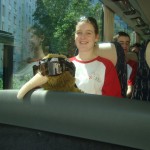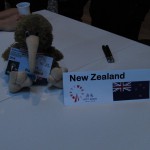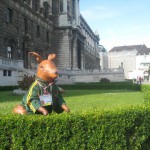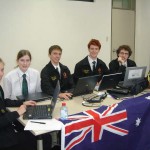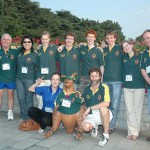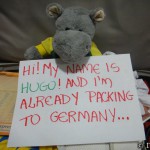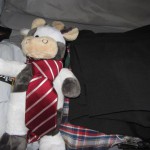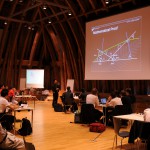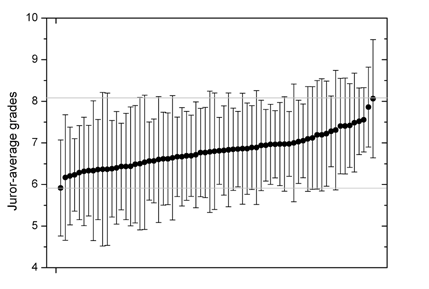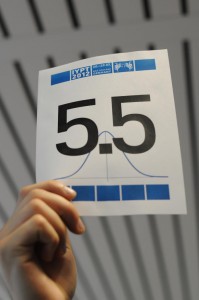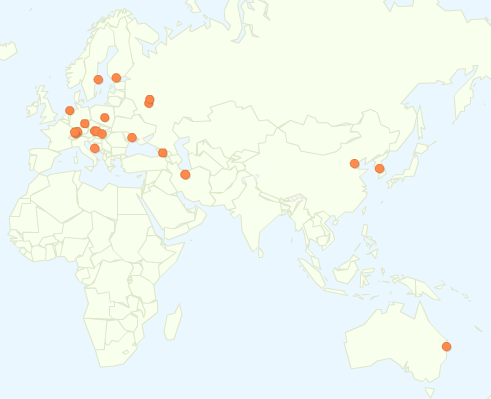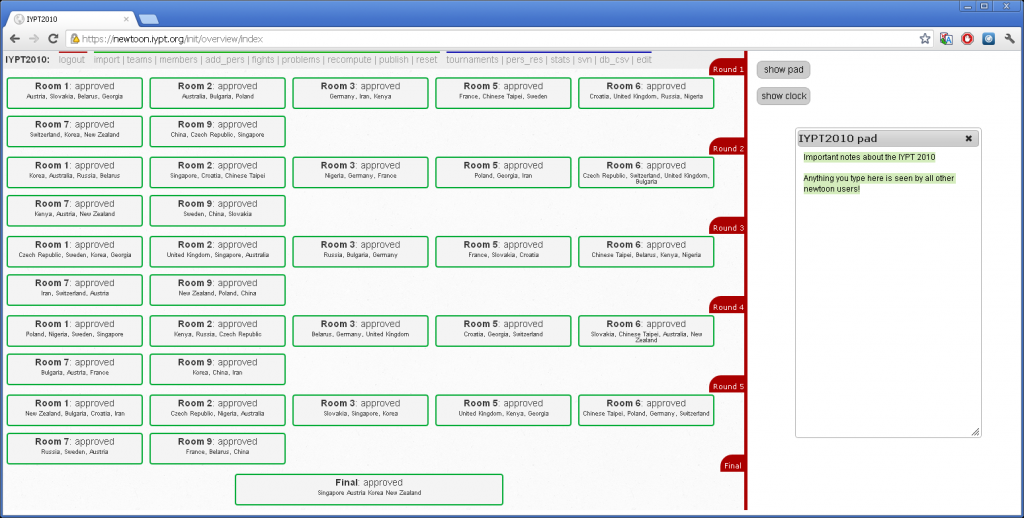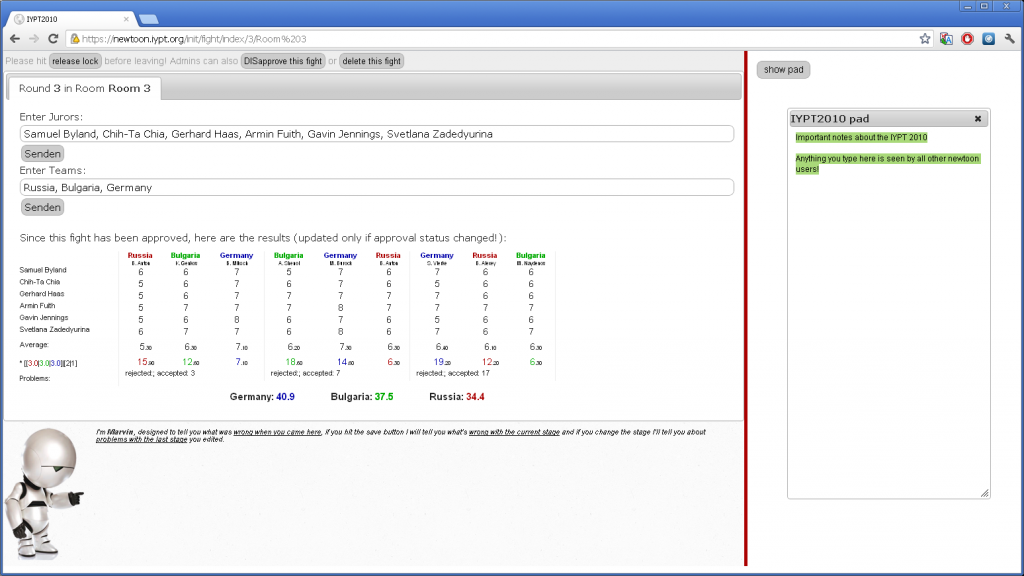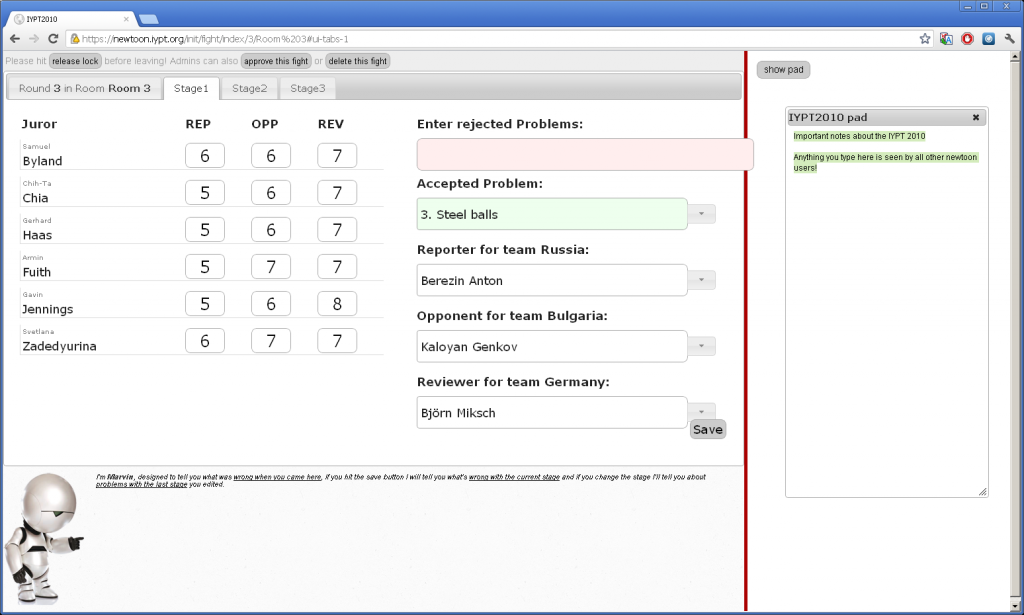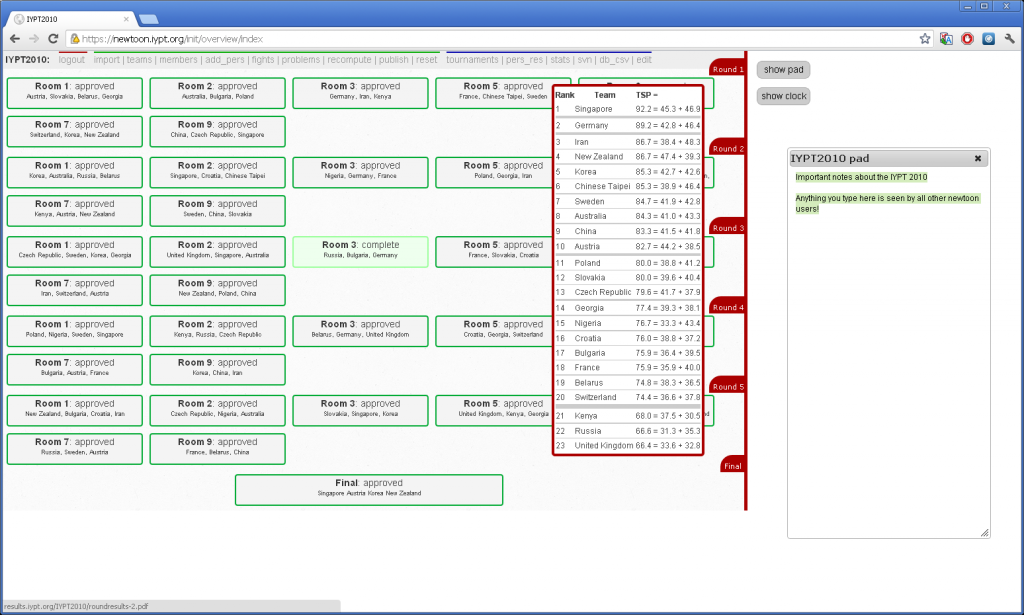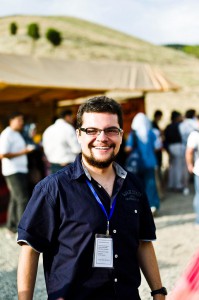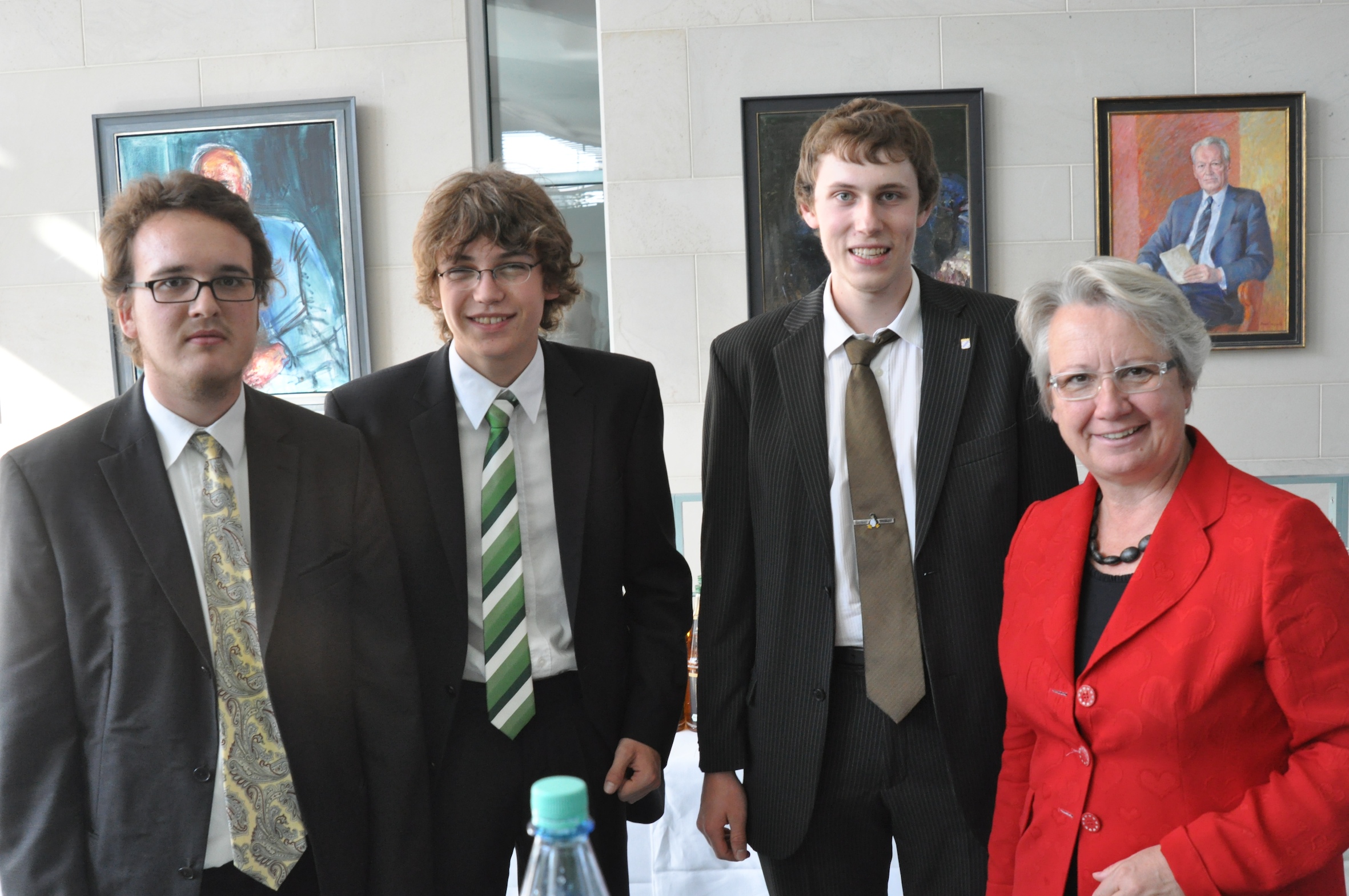
(Deutsch) Junge Forscher bei Aesculap
August 17., 2012 14:21Sorry, this entry is only available in Deutsch.
Posted in press review | Leave a comment(Deutsch) Rückmeldung der IYPT-Teilnehmer zum Aufenthalt in Bad Saulgau
August 17., 2012 14:19Sorry, this entry is only available in Deutsch.
Posted in press review | Leave a comment(Deutsch) Elite-Schule für die besten Köpfe
August 2., 2012 10:21Sorry, this entry is only available in Deutsch.
Posted in press review | Leave a comment(Deutsch) Physik-Weltcup
August 1., 2012 10:19Sorry, this entry is only available in Deutsch.
Posted in press review | Leave a commentVideo of the finals
July 31., 2012 12:09Here we go: Full coverage of the final’s of IYPT 2012. Have fun watching!
Posted in blog | Leave a comment(Deutsch) Michael Kern holt mit seinem Team Silber beim Physik-Weltcup
July 30., 2012 18:28Sorry, this entry is only available in Deutsch.
Posted in press review | Leave a comment(Deutsch) Nachwuchsforscher probieren Bauchspiegelung aus
July 30., 2012 18:26Sorry, this entry is only available in Deutsch.
Posted in press review | Leave a comment(Deutsch) Medaillenregen und lobende Worte
July 28., 2012 11:20Sorry, this entry is only available in Deutsch.
Posted in press review | Leave a commentThe Tournament ist closed
July 28., 2012 11:02The Award Ceremony took place on thursday. The winning teams received their medals.
Posted in lead stories | Leave a comment(Deutsch) Zum Abschluss gibts Lob und Medaillen
July 28., 2012 10:16Sorry, this entry is only available in Deutsch.
Posted in press review | Leave a commentPhysics World Cup in Bad Saulgau: Tournament Winners Honoured
July 27., 2012 18:42The winners of this year’s Physics World Cup were honoured in Bad Saulgau on Thursday. The results of the preliminary rounds determined the winners of the gold medal. They were Iran, Singapore and South Korea.
In the Final on Wednesday, in which each team presented one more problem, South Korea came out on top and was named “Winner of the Tournament”.
The German team came in fifth place after Belarus and received the silver medal. According to the regulations places four to eight are awarded the silver medal.
On Friday morning the 28 teams and those accompanying them travelled to Stuttgart where they visited the Daimler plant and the Mercedes Museum. On Sunday morning the 300 visitors will then embark on their journey home.
The World Physics Cup will take place in Taiwan next year.
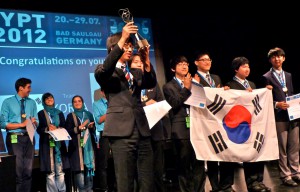
On Thursday evening the winning teams of the Physics World Cup were honoured in Bad Saulgau. The teams coming in first, second and third were all awarded the gold medal. South Korea was named “Winner of the Tournament” having achieved the highest number of points in the Final.
Alan Allinson, President of the International Young Physicists’ Tournament (IYPT), and District President Hermann Strampfer presenting the silver medal to the German captain, Michael Kern from Biberach. According to the regulations teams coming in fourth to eighth receive the silver medal.
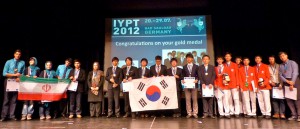
The gold medal winners of the Physics World Cup 2012. The teams from left to right are Iran, South Korea and Singapore.
Posted in press releases | Leave a comment
(Deutsch) Schüler bei Storz und Aesculap
July 27., 2012 14:58Sorry, this entry is only available in Deutsch.
Posted in press review | Leave a comment(Deutsch) Südkorea siegt in Saulgau
July 27., 2012 11:24Sorry, this entry is only available in Deutsch.
Posted in press review | Leave a comment(Deutsch) Korea gewinnt Physik-Weltcup
July 27., 2012 11:14Artikel auf Pro-Physik.de am 27.07.2012 Vollständiger Artikel…
(Deutsch) Silber für das Deutsche Team
July 26., 2012 17:40Sorry, this entry is only available in Deutsch.
Posted in press review | Leave a commentThe Finals are over
July 26., 2012 6:59Team Korea is Winner of the Tournament
Posted in lead stories | Leave a commentIYPT on regioTV
July 26., 2012 6:55There is a clip produced by regioTV.
Posted in press review | Leave a comment
(Deutsch) Bad Saulgau international
July 26., 2012 5:32Sorry, this entry is only available in Deutsch.
Posted in press review | Leave a commentThe Finals of IYPT 2012
July 25., 2012 9:05Just like back in 2010, here are some notes and pictures taken during the finals:
The teams of Korea, Singapore and Iran are getting ready!
First we’ll hear WuHyun Sohn from Korea with his report on Problem 1. Gaussian cannon!
President Alan Allinson is asking everybody in, the Stadtforum Bad Saulgau is completely filled, everything is prepared and the teams are getting ready!
Introduction of the teams:
Three former participants in the Jury: Ilya, Martin and Kathryn:
Korea’s report hast just started. Here’s Singapore’s mascot listening carefully:
The jury for IYPT 2012 finals:
Alan Allinson, Prapun Manyum, John Balcombe, Ivan Antsipau, Chuanyong Li, Valentin Lobyshev, Samuel Byland, Kreso Zadro, Kathryn Zealand, Martin Plesch, Othmar Marti and Ilya Martchenko
The opponent takes the floor:
Discussion, whiteboard:
From left to right:
Team Iran – Reviewer – Seyed Mohammadali Modarressi
Team Singapore – Opponent – Jie Yeo
Team Korea – Reporter – WuHyun Sohn
Last year Korea ended their concluding remarks with the words “This is physics” – today we get to see more fun videos ![]()
Juror grades are in:
REP: 8 8 9 8 7 8 7 7 7 8 8
OPP: 8 8 8 8 8 6 8 8 8 9 8
REV: 8 9 7 9 9 7 8 9 8 8 9
Stage 2 is about to start.
Daniel Keat Kay Mark will do his report on 5. Bright waves.
I asked the teams before if they needed a table for showing experiments. Sadly they don’t ![]()
Grades from stage 2:
REP: 9 9 8 8 8 7 7 6 6 7 10
OPP: 7 8 8 9 8 7 7 7 6 6 9
REV: 9 9 9 9 9 9 8 9 9 7 8
Waiting for Iran’s report. They might well win this IYPT if their report is good – Korea and Singapore got the exact same points for their reports. It’s your turn now, Rojin Anbarafshan!
REP: 7 9 10 9 9 8 8 6 6 7 8
OPP: 9 9 9 8 7 9 7 10 9 7 9
REV: 8 8 7 7 8 7 8 8 8 7 9
So the winners are:
1) Korea
2) Iran
3) Singapore
Congrats to everyone!
Posted in blog | 6 Comments(Deutsch) Schüler aus Südkorea triumphieren beim Physik-Weltcup in Bad Saulgau
July 25., 2012 6:40Sorry, this entry is only available in Deutsch.
Posted in press review | Leave a comment(Deutsch) Beste Werbung für die Stadt
July 25., 2012 5:43Sorry, this entry is only available in Deutsch.
Posted in press review | Leave a commentSouth Korea, Singapore and Iran winners of Physics World Cup
July 24., 2012 17:16The preliminary rounds of the International Young Physicists’ Tournament which determined the finalists ended today. Taking part in the final round tomorrow will be South Korea in first place with 227.1 points, Singapore in second place with 216.8 points and Iran in third place with 205.1 points.
The teams in first to third places will receive gold medals since according to the rules all the finalists are awarded the gold. During the final round tomorrow the young researchers will be able to demonstrate their skills once more, this time with a project of their choice and not one chosen by the opposing team. The final round determines the “Winner of the Tournament”.
South Korea and Singapore confidently led throughout the preliminary rounds. Germany with 196.9 points came in fifth after Belarus with 197 points. Silver will go to teams coming in at fourth to eighth place, bronze to teams in ninth to fourteenth place.
The medals will be awarded on during the Award Ceremony on Thursday evening. But before taking possession of their medals the participants will go to Friedrichshafen for a Lake Constance Day by invitation of ZF Friedrichshafen, the automotive supplier. On Wednesday afternoon the young scientists have the choice of visiting either the medical technology enterprises Aesculap and Karl Storz in Tuttlingen, the pharmaceutical firm Böhringer Ingelheim in Biberach, Liebherr in Ehingen or Claas in Bad Saulgau. On Friday morning the 28 teams and those accompanying them will go to Stuttgart to visit the Daimler plant as well as the Mercedes Museum. On Sunday morning the 300 guests will then set off for their trip back home.
The German Team:
Michael Kern (Captain), 17 Jahre, Biberach Wieland Gymnasium Biberach Schülerforschungszentrum Südwürttemberg( SFZ®), Ulm
Paul Hege, 16 Jahre, Kassel Wilhelmsgymnasium Kassel Schülerforschungszentrum Nordhessen (SFN Kassel)
Clemens Borys, 19 Jahre, Vellmar Friedrichsgymnasium Kassel Schülerforschungszentrum Nordhessen (SFN Kassel)
Tobias Schemmelmann, 18 Jahre, Lörrach Hans-Thoma-Gymnasium Lörrach phænovum Schülerforschungszentrum Lörrach-Dreiländereck
Lars Dehlwes, 16 Jahre, Erlangen Ohm-Gymnasium Erlangen, Erlanger Schülerforschungszentrum (ESFZ)
Contact:
Bettina Zeiß
Rombach & Jacobi Kommunikation
E-Mail: zeiss@rombach-jacobi.de
Handy: 0171 9320775
Weitere Informationen:
http://iypt.de
www.facebook.com/iypt2012
www.sfz-bw.de
About the Schülerforschungszentrum Südwürttemberg (SFZ) (Student Research Center, South Württemberg)
The Schülerforschungszenbtrum Südwürttemberg in Bad Saulgau was founded in 1999 after a German team consisting of students from the region of Upper Swabia had won the most important physics competition for students, the International Young Physicists’ Tournament (IYPT) for the second time. Since then it has been promoting and supporting talented young scientists and by doing so would like to counteract the shortage of technical experts. In the meantime further research centers have been created in Tuttlingen, Ulm and Friedrichshafen/Überlingen.
The SFZ is a forge for young talent, an idea workshop, a research laboratory, a knowledge center, a center for gifted students – and a social meeting place. Several hundred students of different ages and from different areas of Baden-Wuerttemberg come regularly to Bad Saulgau or one of the other locations to do independent research, without restrictive guidelines and without a schedule. What they have to bring along is curiosity, stamina, willingness to work on a team and to take part in competitions. They learn to work independently, to research complex questions together with others without knowing beforehand whether or a solution exists. They also learn how to do research as well as acquiring techniques and skills they will need later in their studies or professional lives.
At the SFZ the students’ performance is of the highest level. And yet the Schülerforschungszentrum is not an exclusive institute for the gifted. Although the pupils should be prepared to work hard, be curious and have a good knowledge of mathematics, it is just as important to be willing to work on a team. Social skills are fostered in such an atmosphere. In addition to physics projects, there are also projects in the fields of mathematics, information technology, chemistry, biology, earth sciences and technology. Physics workshops are also offered to primary school students.
Interested and motivated students from the middle and upper divisions of Gymnasiums (college preparatory schools) have the opportunity to increase their knowledge in the sciences or prepare themselves for competitions. Students decide for themselves how often they come to the SFZ because they work not only at the SFZ but also at home and at their schools. The SFZ is supported by the state of Baden-Wuerttemberg, the city of Bad Saulgau, Sigmaringen County, by foundations, companies and private donors.
www.sfz-bw.de
www.facebook/sfzbw
Posted in press releases | Leave a comment(Deutsch) Beim Physik-Weltcup der Schüler begegnen sich 28 Nationen
July 24., 2012 14:56Sorry, this entry is only available in Deutsch.
Posted in press review | Leave a commentTournament Statistics
July 24., 2012 14:15I’m pretty sure you all like numbers a lot. Even more so if they’re used to count stuff:
We printed and scanned about 1000 Scoring Guidelines, almost as many A4 pages with results and previews and another 900 pages of the report on the problems for 2013. There were 18 Beamers in use in the fight rooms, another two in our IT department, and about 5 spare. The fight assistants double checked every grade, we then again checked whether the numbers on the SGs and those input to newtoon are the same. Adding this up there’s been about 7500 grades checked. The combination of the German IT (setting up their own network and server, cloning a special Gentoo installation to 20 Laptops), the Chinese volunteers that did a great job as fight administrators and our new software worked almost flawlessly.
Well, and then there’s the actual tournament statistics, starting with the results.
This graphic shows what problems were presented and rejected:
And I’m sure you want to know what the grades looked like – here’s the jurors’ means and standard deviation:
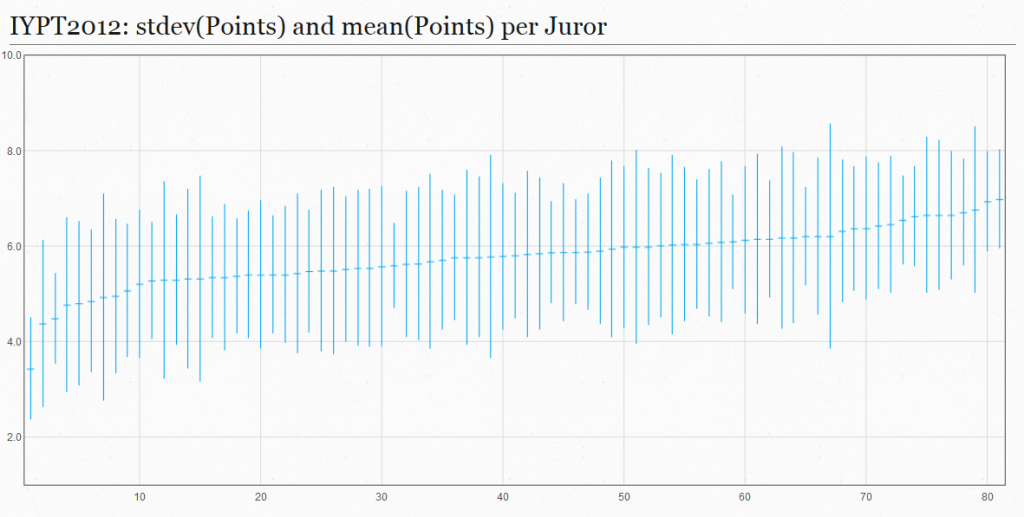
Also, in case you wonder if the jurors were less homogeneous in their grading: Here’s the mean of std. devs and of min-max-differences for each performance:
IYPT2010: 0.8058 / 2.3137
IYPT2011: 0.9094 / 2.5206
IYPT2012: 0.8739 / 2.4333
So no, the grades weren’t too inconsistent, even more consistent than last year.
When Martin Plesch talked to the Jury, he was hoping for an overall mean of 5.5 (in the center of our scale) and a reasonable standard-deviation, somewhere around 1.5. Here’s the number for the IYPT2012:
Mean of Juror means: 5.82
Mean of Juror Stddev: 1.54
So our Jurors did a pretty good job I’d say!
Posted in blog | Leave a commentFinal: Korea, Singapore, Iran
July 24., 2012 13:54Just in case you haven’t heard yet: We’ll have a final of three teams, namely Korea, Singapore and Iran. They will now select their problems for tomorrow. Detailed results are available as usual here: http://results.iypt.org/IYPT2012/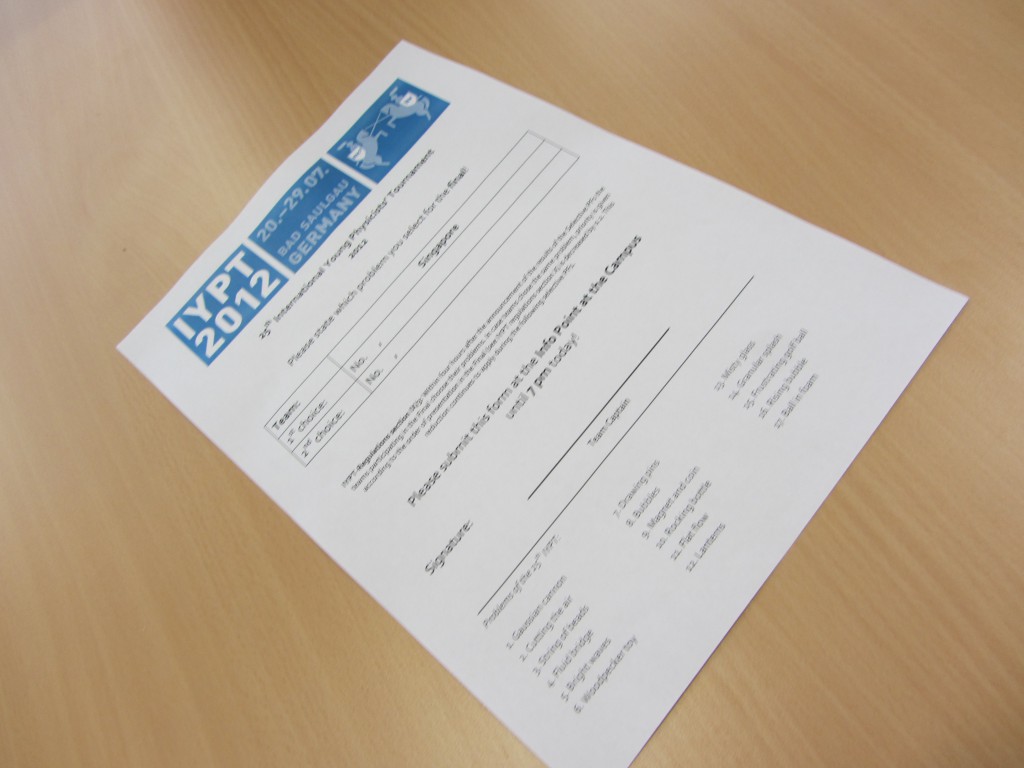
Metin Tolan on TV
July 24., 2012 6:37On Monday evening Mr. Tolan was on TV. The clip is available on the website of the SWR.
Posted in press review | Leave a comment
(Deutsch) 28 Nationen im Wettstreit um den Physik-Weltcup
July 23., 2012 17:35Sorry, this entry is only available in Deutsch.
Posted in press review | Leave a comment(Deutsch) Kluge Köpfe treten gegeneinander an
July 23., 2012 14:27Sorry, this entry is only available in Deutsch.
Posted in press review | Leave a comment(Deutsch) Berichterstattung über den ersten Tag des IYPT 2012 in Bad Saulgau
July 23., 2012 14:20Sorry, this entry is only available in Deutsch.
Posted in press review | Leave a comment(Deutsch) Physik-Weltcup in Bad Saulgau
July 23., 2012 14:15Sorry, this entry is only available in Deutsch.
Posted in press review | Leave a comment(Deutsch) Schavan will nationalen Physik-Wettstreit initieren
July 23., 2012 11:21Sorry, this entry is only available in Deutsch.
Posted in press review | Leave a comment(Deutsch) Einmalig in Europa
July 23., 2012 7:30Sorry, this entry is only available in Deutsch.
Posted in press review | Leave a comment(Deutsch) Genosschenschaftsbanken spenden 13.500 €
July 23., 2012 6:24Sorry, this entry is only available in Deutsch.
Posted in press review | Leave a comment(Deutsch) Physik-Weltcup in Bad Saulgau
July 23., 2012 6:01Sorry, this entry is only available in Deutsch.
Posted in press review | Leave a comment(Deutsch) Wettkampf der Physiktalente
July 22., 2012 14:23Sorry, this entry is only available in Deutsch.
Posted in press review | Leave a comment(Deutsch) 28 Nationen im Wettstreit um den Physik-Weltcup
July 22., 2012 14:17Sorry, this entry is only available in Deutsch.
Posted in press review | Leave a commentthe clock
July 22., 2012 11:35Some have asked already whether they can get the clock. sure ![]() it’s open source (GPL3) and available here:
it’s open source (GPL3) and available here:
http://intern.sfz-bw.de/~simeon.voelkel/gentoo/iyptclock-latest.tar.bz2
If you prefer something browser-based, here’s a clock Georg and I designed (also open source, CC BY-NC-SA 3.0):
https://newtoon.iypt.org/init/static/clock.svg
we had to find a way to get to the fight rooms quickly…
July 22., 2012 11:15
problems from round 1
July 22., 2012 9:13This shows which problems were challenged. Red shows rejections, the numbers count how often they were accepted.
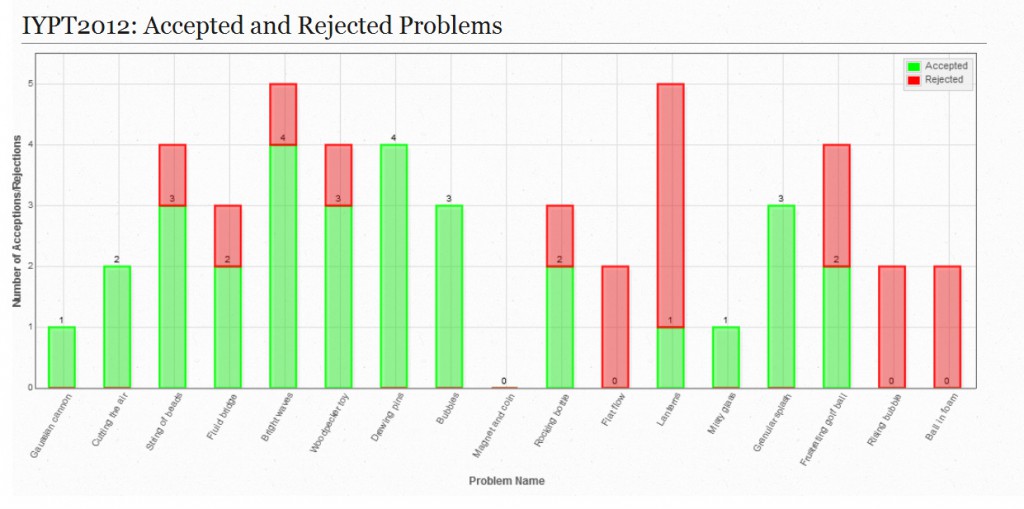
oh, and seeing this graph, here’s one from our server, showing the traffic to and from the server that hosts iypt,org, newtoon, and the results:
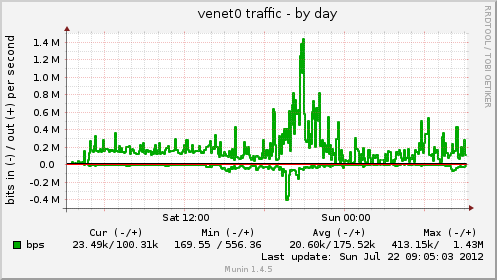
Physics World Cup Starts in Bad Saulgau
July 21., 2012 23:4228 teams from around the world are fighting for the title
21.07.2012 The International Young Physicists’ Tournament (IYPT), the so called Physics World Cup, opened in Bad Saulgau on Saturday morning. It is taking place under the auspices of the German Physics Society (DPG), Bad Honnef and is being organized by the Student Research Center South Wuerttemberg (SFZ), Bad Saulgau.
About 500 guests were invited, among them the participants from 28 countries and those accompanying the teams, representatives of companies that support the competition financially as well as with material and staff, and state and local politicians, school directors and many scientists from cooperating universities.
The tournament, in which teams made up of five members compete against each other in 5 rounds or “physics fights”, will last until July 26. The task: presenting and discussing physics research projects which thestudents have solved. The competition takes place in English but native speakers are not necessarily at an advantage. It is the team that presents a convincing solution to the given problem and is able to defend it rhetorically well in English that gets the points. Knowledge of physics, tactical skill, teamwork and rhetoric are the decisive factors in this complex tournament for students between the ages of 16 and 19.
Many companies are already now lamenting the lack of well-trained young talent. This trend will most likely continue in the coming years due to the demographic changes taking place. This is an important reason why many globally operating companies support this tournament. Emphasizing how important education is especially for a country like Germany, Minister for Education and Research, Annette Schavan said, “Investing in education, science and research is the key to progress and prosperity. Physics plays a central role in this. In order to be successful physics requires cooperation across national borders and subject boundaries. This internationality and the willingness to work together characterize the Physics World Cup in Bad Saulgau. Young people have the opportunity to establish contacts and network among each other and this makes for a very good basis for their future careers in science.”
Also contributing to the ceremonious atmosphere set by the Minister’s speech, were the welcoming speeches of Bad Saulgau’s mayor, Doris Schröter, the head of the local organizing committee, Rudolf Lehn, and the President of the IYPT, Alan Allinson, who also opened the tournament. Physics professor Metin Tolan from the Technical University, Dortmund proved to the audience that physics can also be fun. For years he has been researching the “Physics of James Bond” and, tongue-in-cheek, explores the question of whether the spectacular stunts are possible from a purely scientific point of view.
Germany has been taking part in the tournament, whose venue changes every year, since 1995 and always with representatives from the Student Research Center (SFZ) which was founded in 1999 after the German team had won the gold medal for the third time. Rudolf Lehn, the head of the SFZ was always there. He says, “The IYPT is an extraordinary competition with extraordinary challenges. I know of no other student competition in science and technology that so comprehensively fosters the subject and communicative skills. The young people active in the IYPT are network savvy, possess argumentative skills and are able to think on their feet. They also excel in giving presentations and can deal with conflict. These young problem solvers from around the world are meeting here at the IYPT to compete against each other in a scientific and friendly atmosphere.”
The organizers are expecting costs to exceed € 400,000 raised solely through contributions from companies, foundations, local and regional public institutions as well as the Federal Ministry of Education and Research.
The participants of this year’s German team come from three Länder: Clemens Borys, 19, and Paul Hege, 16 from Kassel in Hesse, Lars Dehlwes, 16,from Erlangen in Bavaria, Tobias Schemmelmann, 18, from Lörrach and Captain Michael Kern, 17, from Biberach all in Baden Wuerttemberg.
The team competition was conceived in 1979 at the State University of Moscow which was sole organizer until 1993. A German team participated for the first time in 1995 in Poland and won the first prize. After the German team won the tournament again in 1999 the idea of founding a student research center took shape.
The German Team:
Michael Kern (Captain), 17 Jahre, Biberach Wieland Gymnasium Biberach Schülerforschungszentrum Südwürttemberg( SFZ®), Ulm
Paul Hege, 16 Jahre, Kassel Wilhelmsgymnasium Kassel Schülerforschungszentrum Nordhessen (SFN Kassel)
Clemens Borys, 19 Jahre, Vellmar Friedrichsgymnasium Kassel Schülerforschungszentrum Nordhessen (SFN Kassel)
Tobias Schemmelmann, 18 Jahre, Lörrach Hans-Thoma-Gymnasium Lörrach phænovum Schülerforschungszentrum Lörrach-Dreiländereck
Lars Dehlwes, 16 Jahre, Erlangen Ohm-Gymnasium Erlangen, Erlanger Schülerforschungszentrum (ESFZ)
Contact:
Bettina Zeiß
Rombach & Jacobi Kommunikation
E-Mail: zeiss@rombach-jacobi.de
Handy: 0171 9320775
Weitere Informationen:
http://iypt.de
www.facebook.com/iypt2012
www.sfz-bw.de
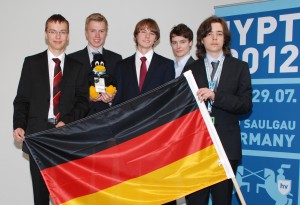
The German Team (f.l.t.r: Captain Michael Kern, Tobias Schemmelmann, Lars Dehlwes, Clemens Borys, Paul Hege)
Posted in press releases | Leave a comment
The Tournament is open
July 21., 2012 22:57 Posted in lead stories | Leave a commentTeams and Flags
July 21., 2012 22:4928 nations arrived
Posted in lead stories | Leave a commentIYPT 2012 on TV
July 21., 2012 22:33On Saturday the IYPT 2012 was on TV. The clip is available on the website of the SWR.
Posted in press review | Leave a comment
Before the opening
July 21., 2012 22:12 Posted in lead stories | Leave a commentfirst results are in
July 21., 2012 20:20First results are in. They can be found at http://results.iypt.org/IYPT2012 and the scanned Scoring Guidelines that include the partial grades are available here: http://results.iypt.org/IYPT2012/SG/
Update: The previews for round 2.
Overview for Round: 1
| Rank | Team | TSP = | |
|---|---|---|---|
| 1 | Korea | 44.7 = | 44.7 |
| 2 | Singapore | 40.1 = | 40.1 |
| 3 | Russia | 38.7 = | 38.7 |
| 4 | Slovakia | 38.5 = | 38.5 |
| 5 | Chinese Taipei | 38.1 = | 38.1 |
| 6 | Switzerland | 37.2 = | 37.2 |
| 7 | Belarus | 36.7 = | 36.7 |
| 8 | Austria | 36.5 = | 36.5 |
| 9 | Georgia | 35.5 = | 35.5 |
| 10 | Germany | 35.4 = | 35.4 |
| 11 | Iran | 34.8 = | 34.8 |
| 12 | New Zealand | 34.8 = | 34.8 |
| 13 | Czech Republic | 34.1 = | 34.1 |
| 14 | China | 33.7 = | 33.7 |
| 15 | Brazil | 33.5 = | 33.5 |
| 16 | France | 31.2 = | 31.2 |
| 17 | Australia | 30.9 = | 30.9 |
| 18 | Poland | 30.1 = | 30.1 |
| 19 | Bulgaria | 30.0 = | 30.0 |
| 20 | Sweden | 29.9 = | 29.9 |
| 21 | United Kingdom | 29.4 = | 29.4 |
| 22 | Thailand | 29.2 = | 29.2 |
| 23 | Hungary | 27.6 = | 27.6 |
| 24 | Kenya | 23.2 = | 23.2 |
| 25 | Indonesia | 22.3 = | 22.3 |
| 26 | Slovenia | 20.8 = | 20.8 |
| 27 | Netherlands | 17.0 = | 17.0 |
| 28 | Nigeria | 14.5 = | 14.5 |
Thomas came all the way from Frankfurt to help us over the weekend – preparations for tomorrow are already done.
Posted in blog | Leave a commentSchedule
July 21., 2012 11:20Hey! We’re done with both the schedule for the teams (based on the drawing of lots) and the jury distribution (based on the team’s schedule). We did it in record time. Hopefully with a record minimum of mistakes too ![]()
Here is the schedule, based on the drawing of lots and here we have the Jury Schedule.
(Deutsch) Das Zittern gehört zum Job
July 21., 2012 11:10Sorry, this entry is only available in Deutsch.
Posted in press review | Leave a comment(Deutsch) Das Duell der Tüftler
July 21., 2012 8:46Sorry, this entry is only available in Deutsch.
Posted in press review | Leave a comment(Deutsch) Teams aus aller Welt kommen
July 20., 2012 15:00Sorry, this entry is only available in Deutsch.
Posted in press review | Leave a comment(Deutsch) Bad Saulgau ist der Nabel der jungen Physik-Welt
July 20., 2012 13:32Sorry, this entry is only available in Deutsch.
Posted in press review | Leave a comment(Deutsch) Junge Physiker sind bei den Guides in guten Händen
July 20., 2012 12:34Sorry, this entry is only available in Deutsch.
Posted in press review | Leave a comment(Deutsch) Eine Stadt in Physik!
July 19., 2012 14:35Sorry, this entry is only available in Deutsch.
Posted in press review | Leave a comment(Deutsch) So spannend ist Physik
July 19., 2012 14:28Sorry, this entry is only available in Deutsch.
Posted in press review | Leave a commentIt’s all about the IYPT in Bad Saulgau
July 19., 2012 14:03The LOC must have been busy in the last few weeks: There are smaller and larger hints that the IYPT takes place in Bad Saulgau literally everywhere – here’s a few of them that I photographed so far:
I was especially excited to see little exhibitions showing former IYPT problems, posters and experiments in the display-windows of local shops. I guess that’s the main advantage that a small city like Bad Saulgau has to offer – everyone including the city’s mayor is involved and they all do their very best to make the IYPT family feel at home!
Find us on facebook for more photos!
Posted in blog | Leave a comment(Deutsch) Kreissparkasse spendet 20.000 € fürs IYPT
July 19., 2012 11:13Sorry, this entry is only available in Deutsch.
Posted in press review | Leave a comment(Deutsch) Veranstaltungen für die Öffentlichkeit
July 19., 2012 9:38Sorry, this entry is only available in Deutsch.
Posted in most recent | Leave a comment(Deutsch) SFZ-Schüler prägen das deutsche Team
July 19., 2012 8:38Sorry, this entry is only available in Deutsch.
Posted in press review | Leave a comment(Deutsch) Biberacher und Langenauer treten bei Physik Weltcup an
July 19., 2012 6:47Sorry, this entry is only available in Deutsch.
Posted in press review | Leave a comment(Deutsch) Kampf mit Wissen und Können
July 19., 2012 6:34Sorry, this entry is only available in Deutsch.
Posted in press review | Leave a commentmascots
July 18., 2012 23:49A mascot, according to wikipedia, is “any person, animal, or object thought to bring luck”.
Even though you’d expect these young physicist to despise the notion of luck, many teams have mascots, some already for many years.
Probably the reason for that is the second meaning wikipedia gives: “anything used to represent a group with a common public identity”.
So who are the brave mascots that “represent” some of the IYPT teams?
Well, the first one I met was “Schrödigger Der Kangaroo”, the Australian teem’s mascot. Didn’t anybody tell them that it’s “das Känguru”?
According to its facebook profile, Schrödigger was born August 12, 1994 which makes it one of the younger mascots. Lise Muh, the Austrian mascot, was born on November 7th, 1978. She’s named after one of the great Austrian female Physicists, Lise Meitner. Then we have Hugo Brasil from – you guessed it: Brasil – and Ernie Rutherford from New Zealand.
And last not least Supermilchchue from Switzerland.
Here’s some photos of all these brave mascots ![]()
Leave a comment if your team has a mascot too!
Posted in blog | 2 Commentsthe IYPT has (almost) started!
July 18., 2012 16:26The tournament officially starts when Alan Allinson opens it this Saturday. But for me the start is leaving home (though I must admit going from Graz to Bad Saulgau for the third time now is not too exciting any more) and switching to that deep IYPT mode, were everything else slowly fades away. Teams from all around the world, preparations, fights, sleep deprivation – it’s a very special blend of topics, feelings and impressions every year.
Next time i’ll write it will be from Bad Saulgau. See you there!
Posted in blog | Leave a comment(Deutsch) Physik-Weltcup startet in Deutschland unter Schirmherrschaft der DPG
July 18., 2012 13:44Sorry, this entry is only available in Deutsch.
Posted in press review | Leave a comment(Deutsch) Ab Freitag steht Bad Saulgau im Zeichen der Physik
July 18., 2012 9:32Sorry, this entry is only available in Deutsch.
Posted in press review | Leave a comment(Deutsch) 28 Nationen beim Physik Weltcup
July 18., 2012 6:36Sorry, this entry is only available in Deutsch.
Posted in press review | Leave a commentThe Physics World Cup in Bad Saulgau
July 17., 2012 16:49The Physics World Cup in Bad Saulgau
Tournament with students from 28 countries begins on July 20
Can you swim in a basin with air bubbles? Where do the light patterns come from that often form on the bottom of a swimming pool? Those who know the answer will not automatically win the International Young Physicists’ Tournament (IYPT), the so called Physics World Cup which takes place in the Upper Swabian town of Bad Saulgau from 20-29 July. Only the team that is able to convincingly present the solution in English in front of the international competition as well as an international jury has a chance to win the most prestigious physics competition for students.
This year the Physics World Cup will take place in the Upper Swabian town of Bad Saulgau after well known venues such as Tehran (2011), Vienna (2010), Seoul (2007) or Brisbane (2004). This year’s organizer, the Schülerforschungszentrum Südwürttemberg (SFZ) (Student Research Center of South Wuerttemberg) was chosen last year to host the event and has consistently sent the most participants over the years. Germany is the most successful country winning seven gold and eight silver medals in 18 tournaments. The Physics World Cup is under the auspices of the German Physics Society (DPG). Annete Schavan, Federal Ministerhysics of Education and Research, will be among the Speakers.
Everyday questions - complex answers
Why is it softer to walk on dry sand than on wet sand? How can a mirage be created in the laboratory? Questions that not even an experienced professor might be able to answer offhand. They are part of the 17 research tasks that are published every autumn and have to be solved by the time the competition takes place in July of the following year. The 16 – 20 year-old students are allowed to use whatever resources they can think of: literature, internet, or experts at universities and industry. During the fights they have to defend their tasks in a rhetorical competition in English against their opponents. This year teams from 28 countries are competing, among them China, Australia, Singapore, Iran, France and Austria.
Numerous companies support the tournament
The organizers are expecting costs to be 400,000 Euros which will be raised solely through contributions from companies and foundations. Many small local companies have agreed to give their support as have global market leaders such as the medical technology firm of Aesculap in Tuttlingen and the construction machine manufacturer Liebherr. Foundations such as the Robert Bosch Foundation or the Dieter Schwarz Foundation in Neckarsulm are also supporting the tournament financially and with specialists from their organizations. They are responsible for financial matters, sponsoring and project controlling as well as arrangements for rooms and catering.
The city of Bad Saulgau is contributing to the event by providing staff and rooms. The opening and closing ceremonies will take place in the Stadtforum, the municipal auditorium.
Wolfgang Hatz, Chairman of Research and Development at Porsche didn’t need a lot of convincing and sees a great benefit to his company. “German industrial companies only have a chance in tough global competition if they produce high quality, innovative cutting-edge-technology and fascinating products. In order to reach these challenging goals we need young people who are curious, enjoy questions posed by technology,and are prepared to work persistently on finding solutions. That is why it is very important to us to support the hosting of the International Physics Tournament 2012, ” says Hatz.
German participants come from Bavaria, Hesse and Baden- Wuerttemberg
Starting for Germany are Clemens Borys, 19, and Paul Hege, 16, both from Kassel, Lars Dehlwes, 17, from Erlangen, Tobias Schemmelmann, 18, from Lörrach, and captain of the team Michael Kern, 17, from Biberach. “Naturally it would be great to stand on the podium in your own country, but we would mainly like to be good hosts, because most of the participants have never been in Germany,” says Rudolf Lehn, Head of the Organizing Committee and Head of the SFZ.
The team competition was conceived by the State University of Moscow in 1979. Until 1993 Moscow University was also the sole organizer. In 1994 the IYPT took place in a western country for the first time – in the Netherlands. A German team participated for the first time in 1995 in Poland and won first place. After the German team won again in 1999 the idea to found a student research center began to take shape.
The German Team
Michael Kern (Captain), 17, Biberach
Wieland Gymnasium Biberach, Schülerforschungszentrum Südwürttemberg (SFZ), Ulm
Paul Hege, 16, Kassel
Wilhelmsgymnasium Kassel, Schülerforschumgszentrum Nordhessen (SFN Kassel)
Clemens Borys, 19, Vellmar
Friedrichsgymnasium Kassel, Schülerforschungszentrum Nordhessen (SFN Kassel)
Tobias Schemmelmann, 18, Lörrach
Hans-Thoma-Gymnasium Lörrach, phaenovum Schülerforschungszentrum Lörrach-Dreiländereck
Lars Dehlwes, 16, Erlangen
Ohm-Gymnasium Erlangen, Erlanger Schülerforschungszentrum (ESFZ)
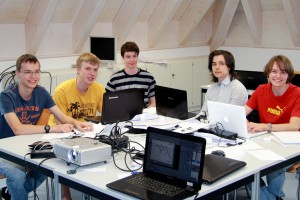
from left to right: Michael Kern, Tobias Schemmelmann, Clemens Borys, Paul Hege, Lars Dehlwes.
Quelle: Aesculap AG
About the Schülerforschungszentrum Südwürttemberg (SFZ) (Student Research Center, South Württemberg)
The Schülerforschungszenbtrum Südwürttemberg in Bad Saulgau was founded in 1999 after a German team consisting of students from the region of Upper Swabia had won the most important physics competition for students, the International Young Physicists’ Tournament (IYPT) for the second time. Since then it has been promoting and supporting talented young scientists and by doing so would like to counteract the shortage of technical experts. In the meantime further research centers have been created in Tuttlingen, Ulm and Friedrichshafen/Überlingen.
The SFZ is a forge for young talent, an idea workshop, a research laboratory, a knowledge center, a center for gifted students – and a social meeting place. Several hundred students of different ages and from different areas of Baden-Wuerttemberg come regularly to Bad Saulgau or one of the other locations to do independent research, without restrictive guidelines and without a schedule. What they have to bring along is curiosity, stamina, willingness to work on a team and to take part in competitions. They learn to work independently, to research complex questions together with others without knowing beforehand whether or a solution exists. They also learn how to do research as well as acquiring techniques and skills they will need later in their studies or professional lives.
At the SFZ the students’ performance is of the highest level. And yet the Schülerforschungszentrum is not an exclusive institute for the gifted. Although the pupils should be prepared to work hard, be curious and have a good knowledge of mathematics, it is just as important to be willing to work on a team. Social skills are fostered in such an atmosphere. In addition to physics projects, there are also projects in the fields of mathematics, information technology, chemistry, biology, earth sciences and technology. Physics workshops are also offered to primary school students.
Interested and motivated students from the middle and upper divisions of Gymnasiums (college preparatory schools) have the opportunity to increase their knowledge in the sciences or prepare themselves for competitions. Students decide for themselves how often they come to the SFZ because they work not only at the SFZ but also at home and at their schools. The SFZ is supported by the state of Baden-Wuerttemberg, the city of Bad Saulgau, Sigmaringen County, by foundations, companies and private donors.
www.sfz-bw.de
www.facebook/sfzbw
(Deutsch) Physik-Weltcup startet in Deutschland unter Schirmherrschaft der DPG
July 17., 2012 13:43Sorry, this entry is only available in Deutsch.
Posted in press review | Leave a comment(Deutsch) Pressemitteilung der Deutschen Physikalischen Gesellschaft (DPG)
July 17., 2012 7:03Sorry, this entry is only available in Deutsch.
Posted in press releases | Leave a comment(Deutsch) Sechs Schüler aus ganz Deutschland bereiten sich in Tuttlingen für den Physik-Weltcup vor
July 17., 2012 6:40Sorry, this entry is only available in Deutsch.
Posted in press review | Leave a commentproblems. and why there’s 17 of them.
July 15., 2012 0:11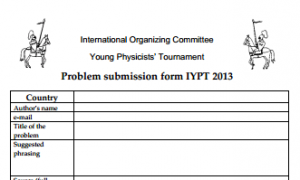
At the core of the IYPT there are the 17 problems that the teams work on for almost a year. They have been repeatedly credited as source of ideas for laboratory tasks, thematic activities in schools, graduation research projects, or even everyday physics teaching.
They look like this one from 2012′s set:
“A long string of beads is released from a beaker by pulling a sufficiently long part of the chain over the edge of the beaker. Due to gravity the speed of the string increases. At a certain moment the string no longer touches the edge of the beaker. Investigate and explain the phenomenon.”
As a participant you might be fascinated by some of them, irritated by others and some will definitely lead to long weekends and a bit of frustration. But have you ever thought about where these problems come from?
Is there a holy book of problems (*) where we can look for them? Is there a large committee of experts spending weeks doing experiments to come up with new things to investigate?
Well, it’s a bit of both actually. Each year the members of the international organizing committee (IOC) are asked to submit ideas for problems. At the IOC meeting, which takes place during or past each year’s IYPT, there’s a discussion on the problems to select for next year and eventually a decision. Sometimes this takes long, other times it takes very long to reach a conclusion. To make sure that we have new high quality problems, even after all these years, last year we decided to introduce a new process:
A pre-selection committee was formed to improve our selection process and we opened the submission of ideas to everyone using a submission form on our website . Details of the new process are documented in the EC minutes from last October.
The committee did some impressive work: The report Ilya has submitted to the IOC is 60 pages and they worked through 89 proposals from 18 countries.
So, what was their selection based on? What makes a good set of problems? The report sums it up as follows:
- No repeated, dangerous, trivial or solved problems.
- Relevance, consistency, feasibility from the IYPT perspective, and reasonable novelty.
- Balanced coverage of various areas of physics.
If you’re interested in some background material for this year’s problems, go check out the kit.
As every year, I’m excited to see what the 17 problems for the next year will be. Why 17 you might still ask yourself: An experienced IOC member once explained it to us in the following way: “Well,… You see, 16 would be too few, but 18 would be too many.”
(*) Some former problems have been inspired by a book that comes quite close to this notion – The Flying Circus of Physics.
Posted in blog | Leave a comment(Deutsch) Wettkampf der Physik-Talente
July 14., 2012 7:36Sorry, this entry is only available in Deutsch.
Posted in press review | Leave a comment(Deutsch) Physik-Weltcup: Deutsches Team trainiert im SFZ-Tuttlingen
July 13., 2012 6:50Sorry, this entry is only available in Deutsch.
Posted in press review | Leave a comment(Deutsch) Physik-Weltcup: Fußball-EM bremst Team der Ukraine
July 12., 2012 8:07Sorry, this entry is only available in Deutsch.
Posted in press review | Leave a comment(Deutsch) 17-jähriger startet beim Physik-Weltcup
July 12., 2012 6:55Sorry, this entry is only available in Deutsch.
Posted in press review | Leave a commentfinals
July 12., 2012 0:06 There’s always something special about the finals: It’s the time to give your peak performance. There’s an audience of your peers who all have worked on the problems you present, who are experts in what you report.Twice as many jurors who watch. All of them experienced, some of them university professors, some teachers, some are former participants. You get a microphone and a stage – and sometimes, there’s even a camera or two looking at you:
2009:
2010:
2011:
PS: You can now link to this blog using http://blog.iypt.de
PPS: Comments are now enabled also for the older postings!
(Deutsch) Executive Committee schaut sich die IYPT-Stätten an
July 10., 2012 9:24Sorry, this entry is only available in Deutsch.
Posted in press review | Leave a commentgrading
July 9., 2012 0:06As promised last time, let’s think about the grading itself a bit. Back in 2010, without the help of our new Scoring Guidelines , the distribution of grades looked like this:
The diagram, like this description taken from Ilya’s archive, shows the distribution parameters (population mean and standard deviation) for grades of individual jurors at the 23rd IYPT (2010.) The grades are averaged across all stages, performances, and PFs. The data clearly reveals that the individual grading standards vary among jurors, and result in a marked spectrum of average grades in the range from ca. 6 to ca. 8. The relative standard deviations, not shown here, vary in the range from ca. 0.1 to ca. 0.3. The marks above 8—9 and below 5—6 are statistically rare events.
One of the SG’s goals is to make it harder for jurors to just give a 7 all the time. Besides being a nice prime number, 7 also is a mark weak teams are happy about and strong teams aren’t too sad about (well, as long as it’s not the finals). Clearly this is not what we want for a tournament. Ideally the overall mean grade in a tournament is somewhere close to 5.5 with all the grades used – e.g. with a reasonable standard deviation. With jurors only giving marks from 6 to 8, we effectively narrow the results so much, that eventually randomness and rounding effects become much to influential. The SG certainly help to avoid this, with results from our national YPT in Austria showing that the standard deviation has improved a lot in the past two years and most of the jurors giving grades as low as 1 and as high as 10 over the course of the tournament.
update: a few more words from Ilya ![]() :
:
[01:14:06] Martchenko, Ilya: http://iypt.de/?p=1222 [01:14:59] Martchenko, Ilya: if you want to be completely open, you can also write that it's *very* important to have all jurors staying centered around one, uniform grade [01:15:06] Martchenko, Ilya: i.e. 5 [01:16:11] Martchenko, Ilya: if it's not happening, we may easily have (and always had) the following situation: [01:16:33] Timotheus Hell: c'mon, i posted this like 5min ago. How can you be that fast?!Posted in blog | 1 Comment[01:17:02] Martchenko, Ilya: in the fight room A by a pure coincidence we have those jurors who put slighly higher grades (right leg of the spectrum) than in the fight room B [01:17:17] Martchenko, Ilya: ** c'mon, it's by job to monitor mass media

Scoring Guidelines
July 6., 2012 10:40The Scoring Guidelines were introduced at the IYPT last year in Iran. Martin Plesch actually gave an in-depth introduction that I made a video of, so in case you’re interested:
Now of course this wasn’t something that the Executive Committee came up with during one of their short meetings. It really was a long process that eventually led us to what I consider a very reasonable and helpful guideline for both new and experienced jurors. As the minutes of the EC meeting back in November 2010 state, “[a]fter discussing many alternatives, MP, TH and JB each volunteered to prepare a proposal for updated guidelines which will be circulated among EC members for a final decision during spring 2011.” My first proposal that I was willing to send around to some of my IYPT-friends dates back to December 2010. It’s interesting how this evolved with all the feedback I got, until eventually sending a version 4 to the EC mailing list in February 2011. Other proposals were submitted too and a long discussion via email followed with a stable result evolving sometime in April 2011. Eventually we voted on a proposal and decided to try it at some national YPTs first. Since the feedback there was mostly positive we went ahead and introduced them at the IYPT2011.
Something as complex as these guidelines will never be perfect. I’m sure the EC will continue to listen to any feedback and that the guidelines will continue to evolve. Much more important than the final details however is, that there are guidelines at all: To me it’s important to have rules that clearly state what this tournament is about – that’s what’s reflected in these guidelines: Physics and communicating Physics. And to make the grading even more transparent for the participants, the grading sheets with their partial grades will be scanned and published.
Next time I’ll write something about the grading and how it has changed over the years.
Posted in blog | Leave a comment(Deutsch) Komittee koordiniert Physik-Weltcup
July 6., 2012 9:07Sorry, this entry is only available in Deutsch.
Posted in press review | Comments Offmore IYPT facts and trivia
July 4., 2012 22:59Hey! Not sure if I can keep up with writing this much for our blog – but then again there is a lot to say about IYPT: Our website has some information, a bit about the history for example. Then there is the excellent wikipedia article. The most impressive collection however is the work of Ilya Martchenko, located at archive.iypt.org: A massive archive dating back to 1979, including presentations, slides, papers and articles written for or about the IYPT. And you’ll find a collection of all the IYPT problems there.
We’d of course never mistake correlation for causation, still it’s soothing to know how successful some former participants became:
Some have completed an undergraduate degree in one and a half years, others have promptly brought their still-IYPT project to a mainstream publication while or even went on to get published in Science or Nature, make front covers, or reach a substantial h-index. Some past participants went on to become indie movie directors, top executives in major banks, or CEO at companies with $120M revenue. Surprisingly, the IYPT has even seen a team leader who went on to become a national prime minister.
Personally I think it’s just amazing with how much dedication and how successfully Ilya has been working on collecting and archiving all of this IYPT-related information. If there is any (new) fact about one of the (old) IYPTs you can share: Ilya will participate at this year’s IYPT as a Juror and I’m sure he’ll be more than happy to collect any new information or material, like documents, photos or videos from you!
To make sure you know whom to approach, here’s a video I took back in 2011 when the archive was officially launched at the 13th AYPT:
Posted in blog | Leave a comment
the biggest IYPT ever – and some other numbers
July 1., 2012 16:23I like numbers and comparing things – that’s something I probably share with many IYPT participants. With newtoon we’ll have all sorts of stats about the tournament itself. But for now – let’s collect some facts and numbers about the IYPT 2012: It’s the biggest IYPT ever, with 28 different nations participating. But is Bad Saulgau the smallest city that has ever hosted the IYPT? One might think so, having had the IYPT in cities like Tehran, Vienna, Tianjin or Seoul. Going back a bit further, 17 years to be precise, the IYPT was hosted in a city that will probably keep the title of smallest-IYPT-host for long: Spała in central Poland currently has a population of 400. That might have been different back in 1995. However also the IYPT has grown: Nowadays counting in all participants, volunteers, jurors etc we’d almost double the population in Spała.
Of the few smaller cities that have had the privilege to host the IYPT, another one is very close: Donaueschingen hosted in 1998. And looking at the map of IYPT hosts, we realize that there is yet another former host nearby: Winterthur in Switzerland which hosted in 2005.
Other numbers never change – we’ll have 17 Problems and Teams of 5 students. Some numbers change slowly: It’s the 25th IYPT already. To celebrate, we’re looking forward to welcoming Evgeny Yunosov, the “father” of the IYPT who was the organizer, main activist and supporter of this new type of competition.
Posted in blog | 1 Commentnewtoon – new tournament organizer over network
June 28., 2012 17:32Yes, finding a suitable acronym for this piece of software Georg, Wolfgang and I have been working on since January proved a first challenge. About 350 person-hours and >500 commits to our svn repository later we’ve completed what might well become the backbone of most future YPT competitions.
Newtoon replaces the old java software Georg wrote about a decade ago, countless excel-sheets former LOCs have used and adds many new features:
Fight assistants will have their own account and can log-in from any internet-enabled computer (in Germany pre-configured Laptops will be provided and ready in each fight room). It will allow them to quickly select their room and round and start entering jurors’ grades. Fight-preview sheets will be generated automatically according to the IYPT regulations. As soon as an administrator approved the input grades, the results will immediately be available online. Once the tournament has started, you’ll find all results and previews here: http://results.iypt.org/IYPT2012/ .
Additionally the system will provide the IOC and LOC with valuable tournament statistics that will help them to further evaluate current scoring guidelines.
That all might sound simple, but doing it right proved challenging. There’s client- and server based validation of any user input, different caching strategies e.g. of results to keep the load on the server low, user authentication with different roles to separate fight-assistants and tournament organizers. Finally there are more boring features like the import of names and schedules to our system but also quite tricky ones like concurrency issues that have to be dealt with, as potentially up to 20 users will input data in parallel.
So far it’s all looking good, we’re continuing to make some final design tweaks and the software was successfully tested at our local YPT.
If you’re a participant the main advantage is that you’ll be provided with more detailed fight results than ever before and faster than ever before.
Posted in blog | 2 Comments(Deutsch) Interview mit Björn Miksch, Team Leader Deutschland
June 27., 2012 7:34Sorry, this entry is only available in Deutsch.
Posted in press releases | Leave a comment(Deutsch) Interview mit Florian Ostermaier, Team Leader Deutschland
June 27., 2012 7:22Sorry, this entry is only available in Deutsch.
Posted in press releases | Leave a commenta few words about this blog
June 25., 2012 11:15 Hey!I’m Tim, former IYPT participant, former IYPT Executive Committee member, 2010 LOC member, iypt.org webmaster and lots of other ypt-related things. This year I’m lucky to be present for the first time at an IYPT without any official role at all – yet probably I’ll be doing one of the most important jobs for all of you participating: Together with Georg and Wolfgang I’ll be responsible for results and fight-previews, distributing jurors to groups and all that other tournament related stuff.
I’ve been blogging about the past two IYPTs and this year I was asked to do the same here ![]() So during the tournament you will find the latest news like results, previews etc here.
So during the tournament you will find the latest news like results, previews etc here.
Make sure to also visit the iypt 2012 facebook page at facebook.com/iypt2012.
Posted in blog | Leave a comment(Deutsch) Physik-Asse
June 13., 2012 16:25Sorry, this entry is only available in Deutsch.
Posted in press review | Comments Off(Deutsch) Deutsches Team mit sechs Schülern wurde in Ulm nominiert
June 7., 2012 10:22Sorry, this entry is only available in Deutsch.
Posted in press releases | Comments Off(Deutsch) Interview mit Bundesforschungsministerin Annette Schavan
June 7., 2012 9:08 Posted in most recent | Comments Off(Deutsch) Schülerforschungszentrum nominiert deutsches Team für Physik-Weltcup
June 5., 2012 21:07Sorry, this entry is only available in Deutsch.
Posted in press review | Comments Off(Deutsch) Anmeldung zum Turnier abgeschlossen
June 2., 2012 9:13Sorry, this entry is only available in Deutsch.
Posted in most recent | Comments Off(Deutsch) Die ganze Welt schaut nach Bad Saulgau
May 3., 2012 18:09Sorry, this entry is only available in Deutsch.
Posted in press review | Comments Off(Deutsch) Physik-Weltcup naht
April 28., 2012 11:19Sorry, this entry is only available in Deutsch.
Posted in press review | Comments OffBad Saulgau hosts the Physics-World Cup
April 23., 2012 6:08Sorry, this entry is only available in Deutsch.
Posted in press releases | Tagged Bad Saulgau, iypt, physics-wordcup, Physik-Weltcup | Comments Off(Deutsch) Weltcup: Schüler messen sich in Physik
April 18., 2012 11:16Sorry, this entry is only available in Deutsch.
Posted in press review | Comments Off(Deutsch) Schüler-Physik-WM in Bad Saulgau
March 21., 2012 18:12Sorry, this entry is only available in Deutsch.
Posted in press review | Comments Off(Deutsch) Physiker ergründen auch den Weg des Golfballs
March 21., 2012 18:11Sorry, this entry is only available in Deutsch.
Posted in press review | Comments OffMinister Warminski-Leitheußer visits the Physics World Cup
January 28., 2012 10:53The Baden-Württemberg minister for culture youth and sports, Gabriele Warminski-Leitheußer, has accepted the invitation to the awards ceremony of the Physics World Cup competition in Bad Saulgau. The awards ceremony will take place on July 26, 2012 at 19:00 in the Stadtforum in Bad Saulgau.
Source picture: by Gabriele_Warminski-Leitheußer.jpg: GRÜNE Baden-Württemberg derivative work: FishInWater (Diskussion) (Gabriele_Warminski-Leitheußer.jpg) [CC-BY-SA-2.0 (www.creativecommons.org/licenses/by-sa/2.0)], durch Wikimedia Commons Posted in most recent | Comments OffFederal Minister Prof. Dr. Annette Schavan visits the Physics World Cup in Bad Saulgau
January 22., 2012 23:51Thomas Bareiß, member of the Bundestag for the electoral district Zollernalb-Sigmaringen, is happy to announce that on his initiative Dr. Annette Schavan, Federal Minister for Education and Research, will be attending the Physics World Cup in Bad Saulgau on July 21, 2012. In the last few years the Physics World Cup has taken place in Seoul, Vienna and Tehran. This year the host will be the Student Research Center in Bad Saulgau. Thirty countries have already registered for the competition.
Source: Website Thomas Bareiß (Member of the Bundestag), January 20, 2012.
Picture: SFZ
Posted in most recent | Tagged Bad Saulgau, physics-worldcup, Physik-Weltcup | Comments OffPhotos
December 3., 2011 20:34The photo-gallery is available now. Team-Photos can be viewed here.
If you want to share photos with the organizing team you may upload them on the computer on the campus.
Statements
December 1., 2011 10:50Bad Saulgau is incredibly proud to host the 2012 IYPT and thus continue the series with cities such as Brisbane, Tehran and Vienna. (Doris Schröter, Mayor of Bad Saulgau)
Posted in Cols | Comments OffNews
November 30., 2011 11:31The Final is over. Results of the Finals: Korea: 48.7 Iran: 46.9 Singapore: 46.7 You can see the results of all fights here.
The IYPT-Film is available now.
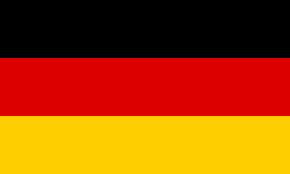
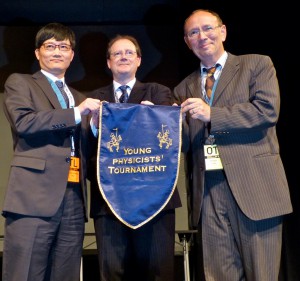
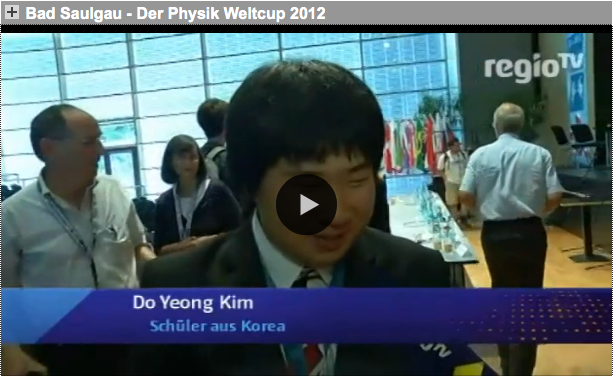
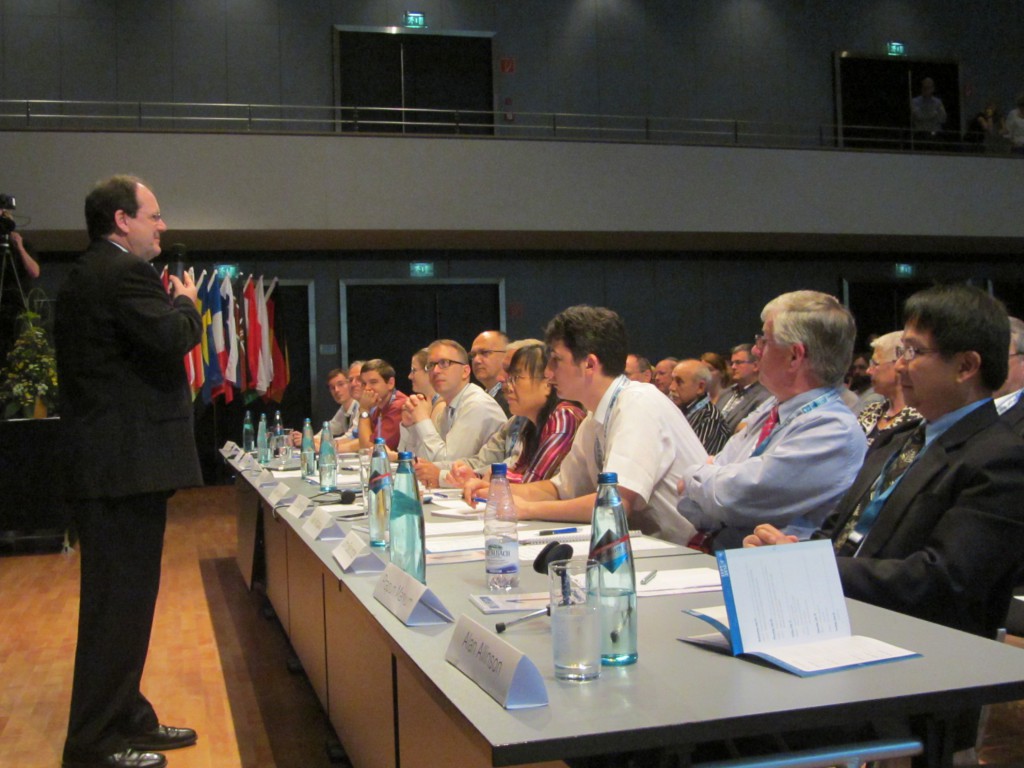

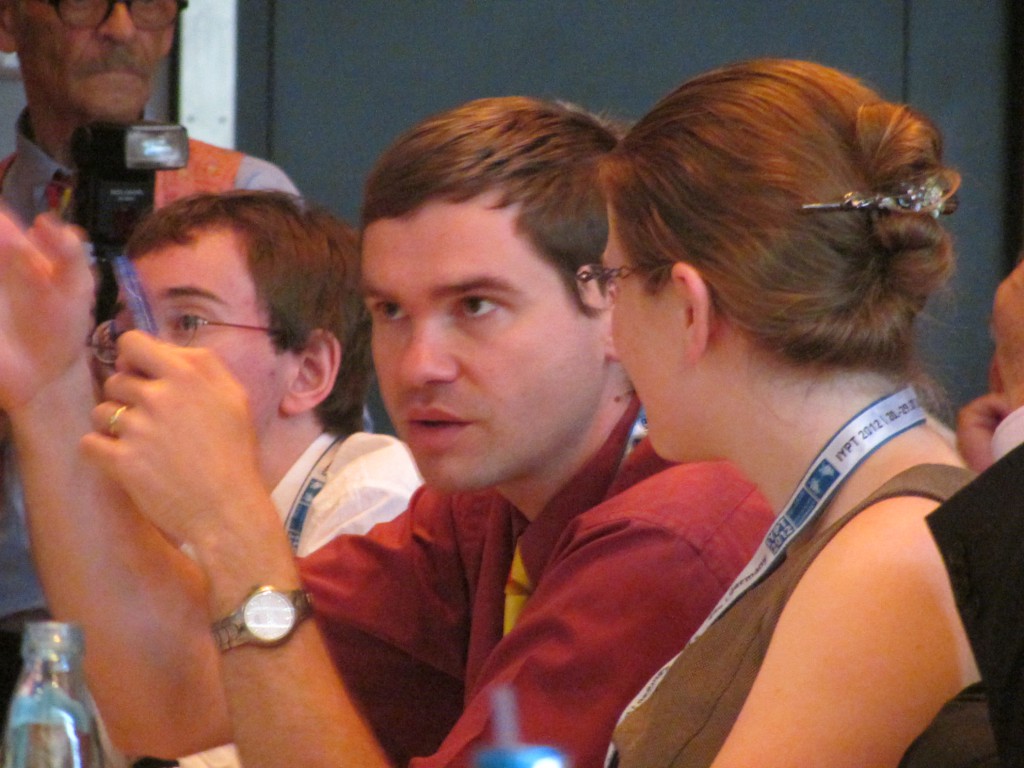
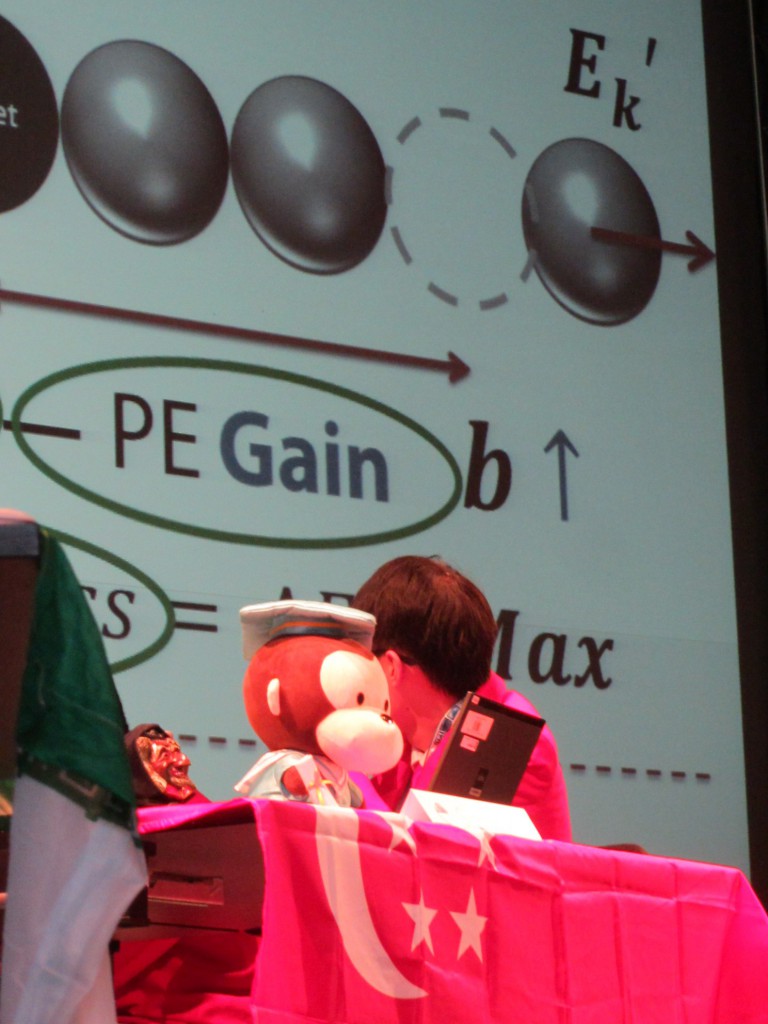
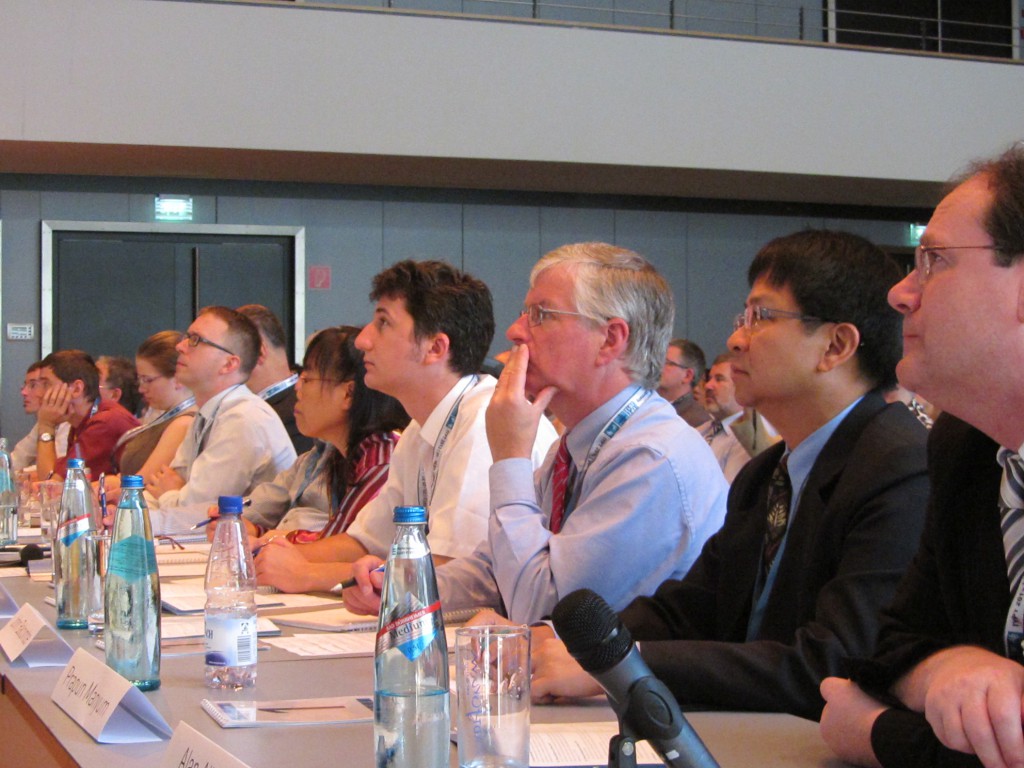
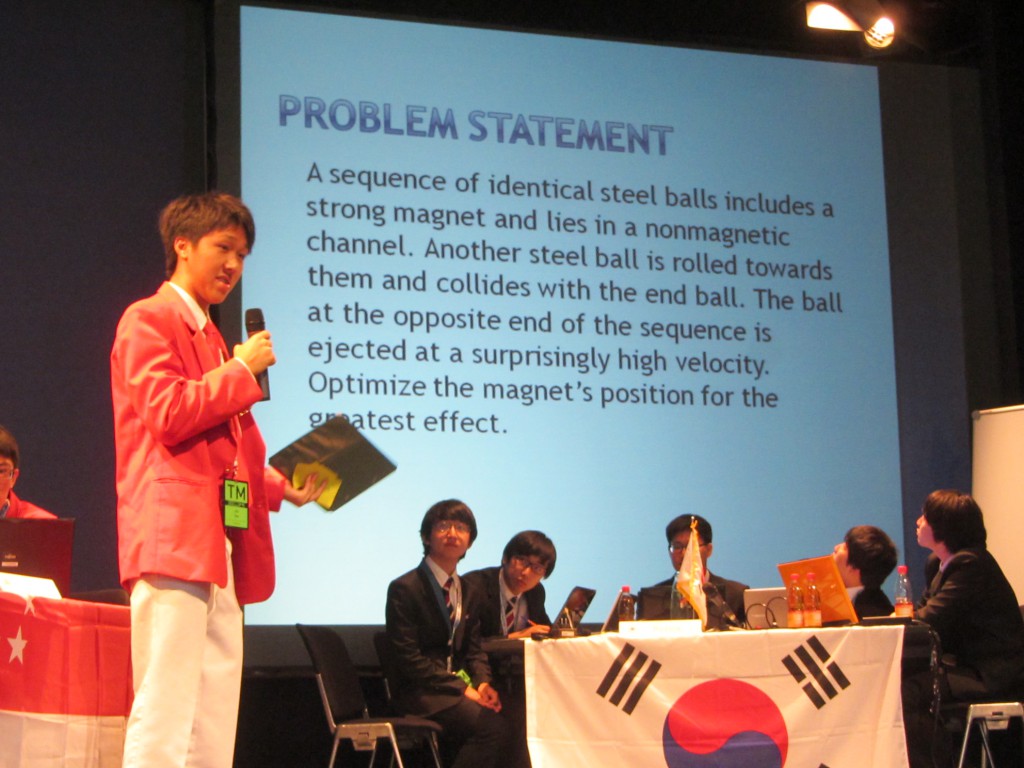
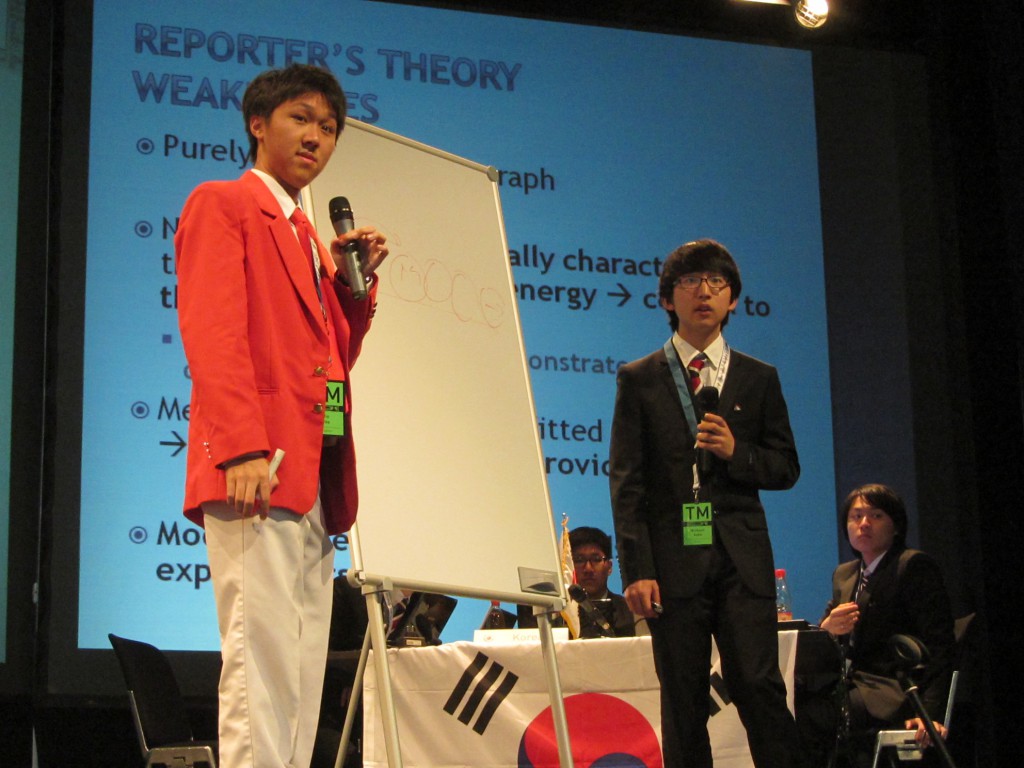
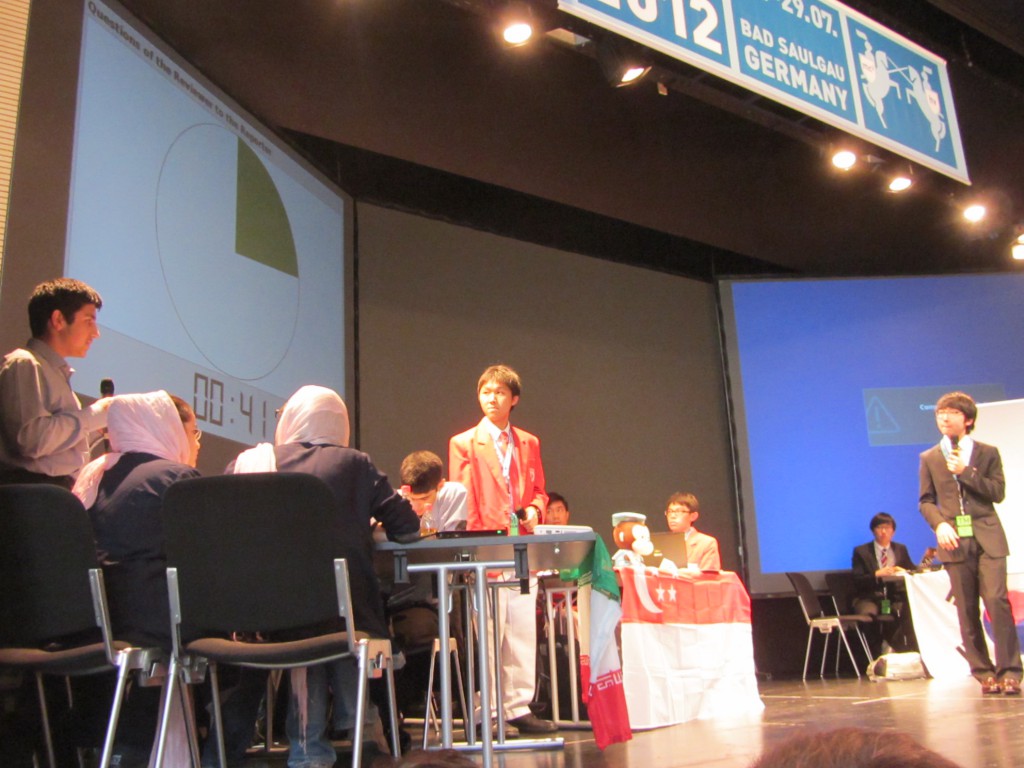
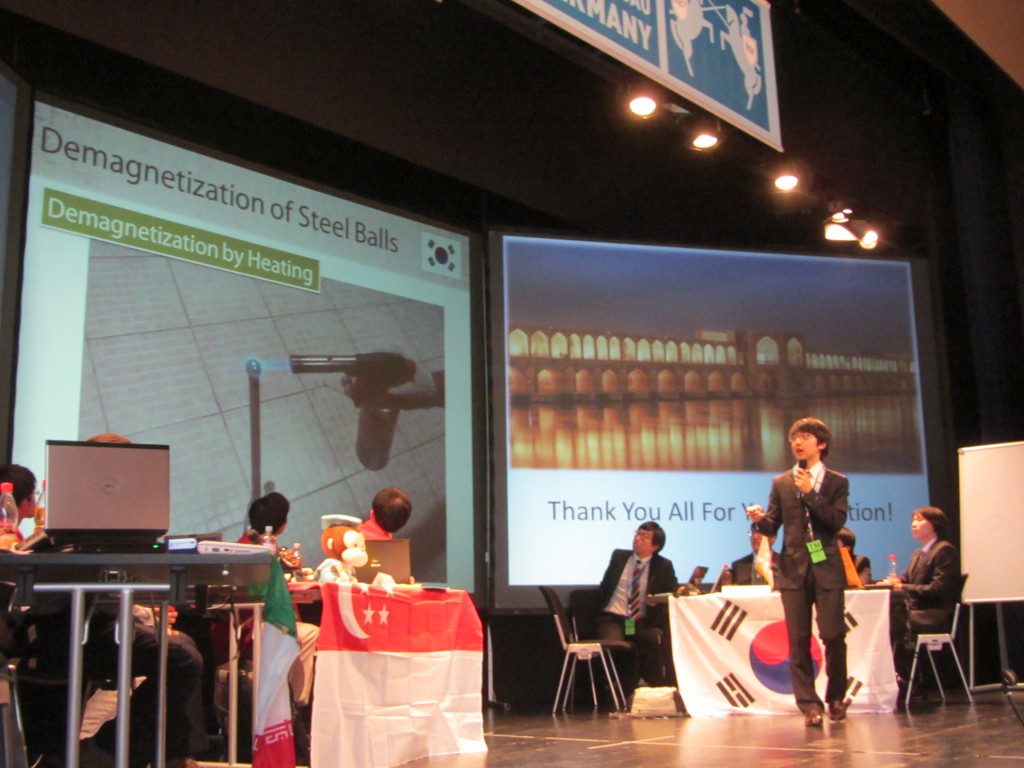
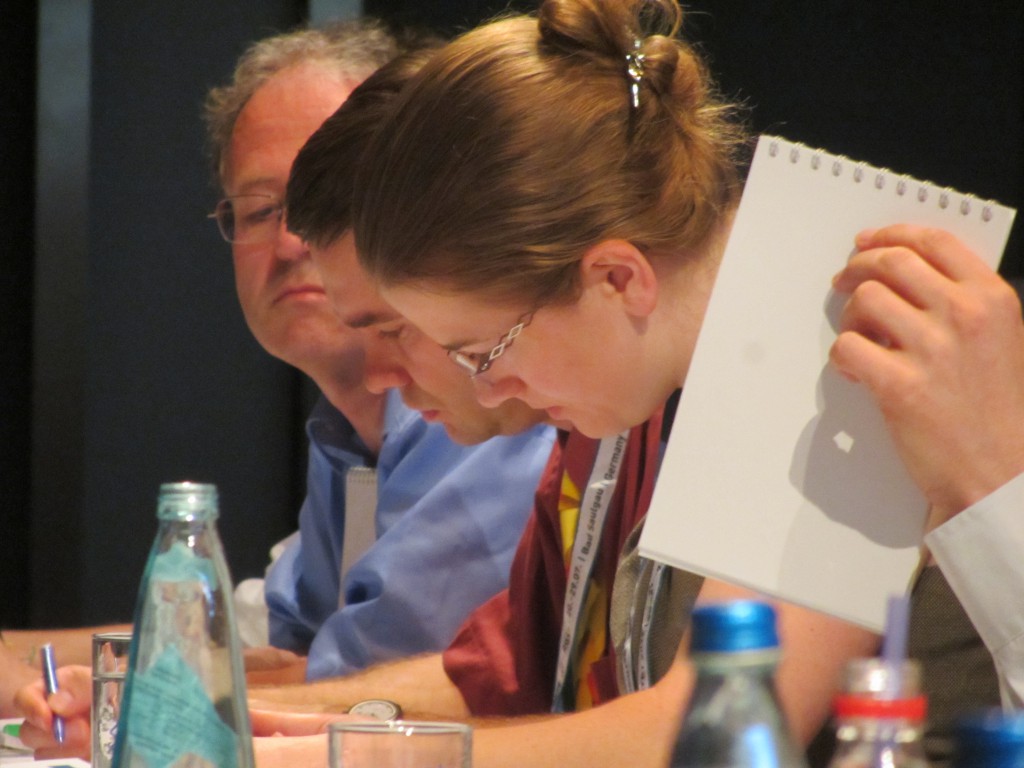
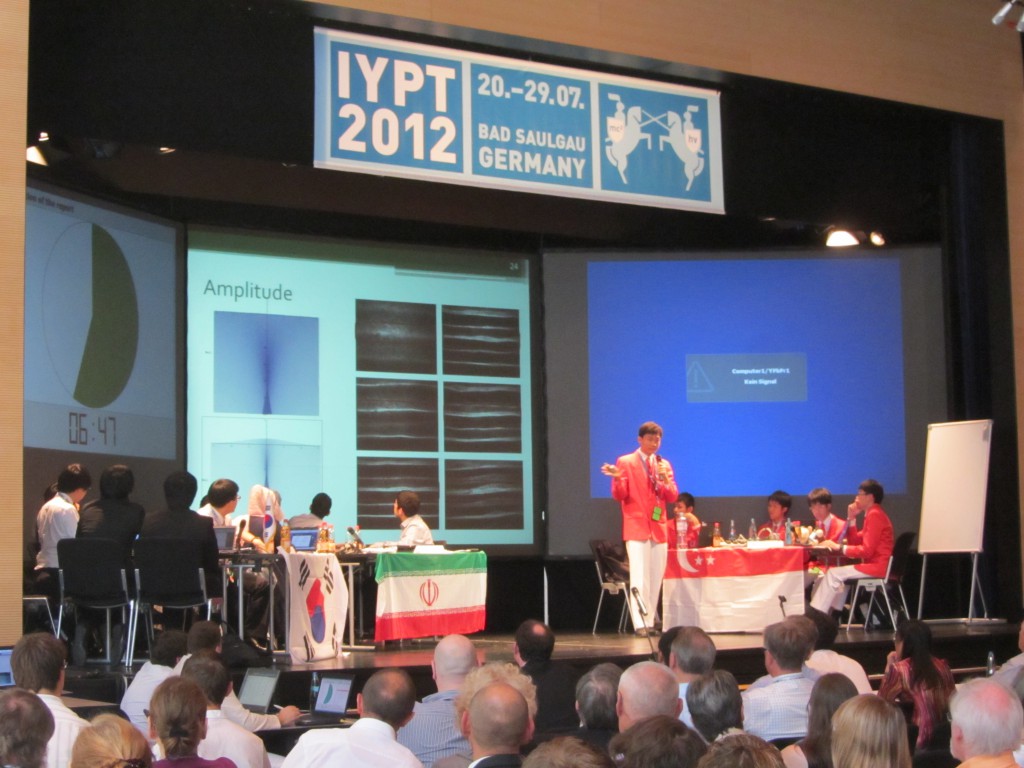
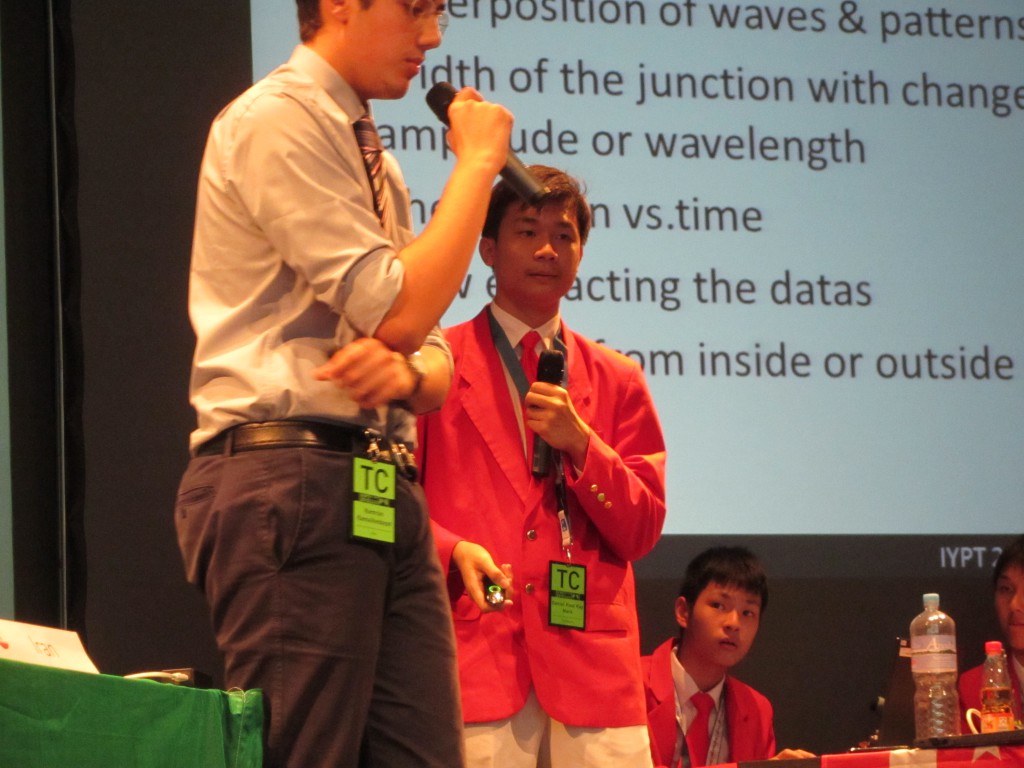
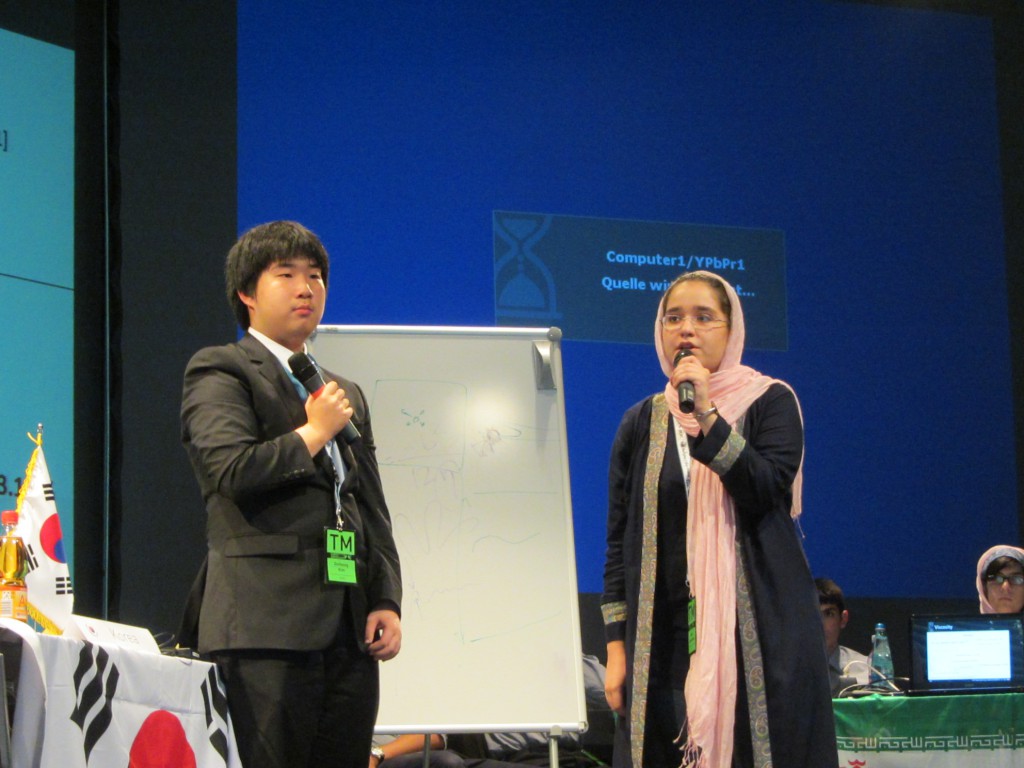
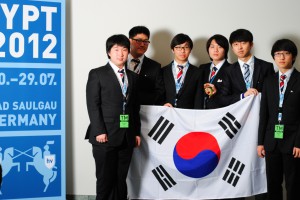
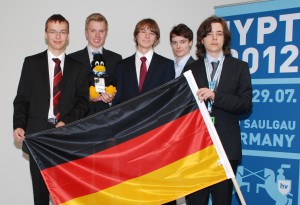
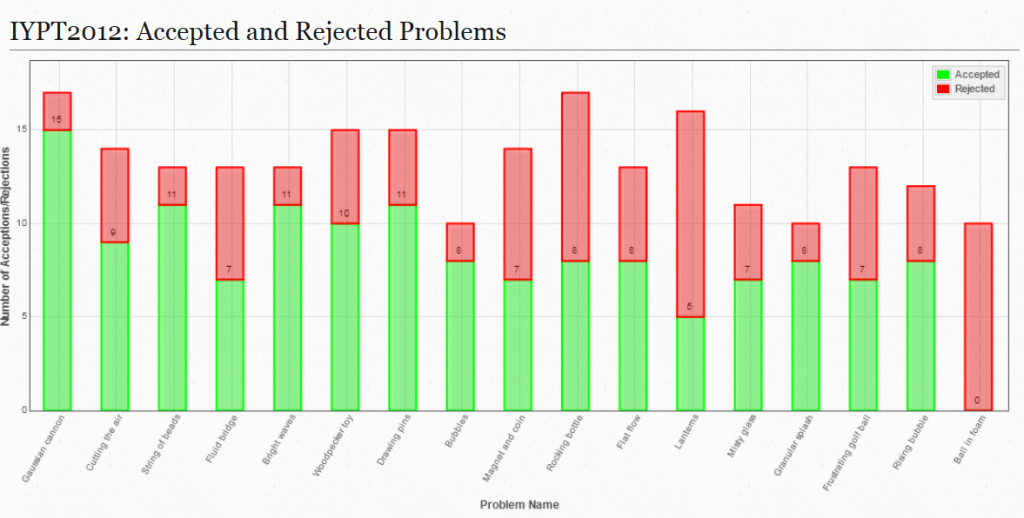
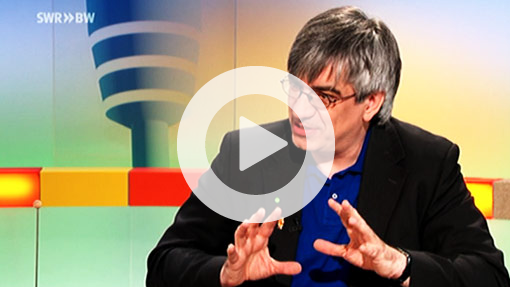
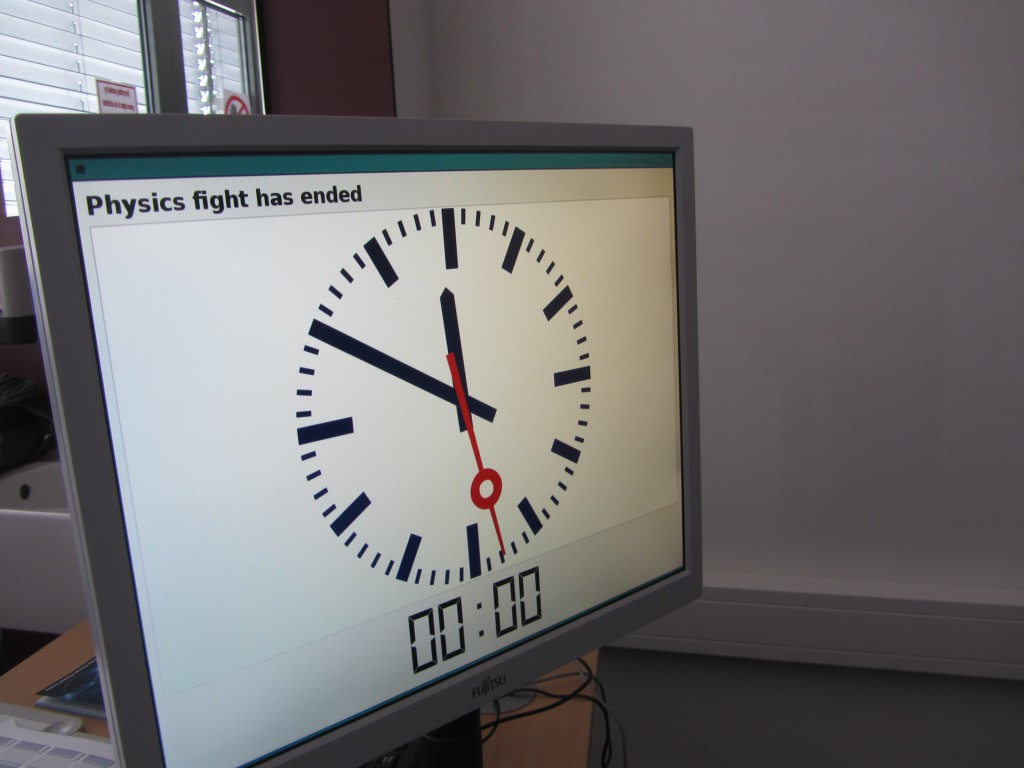
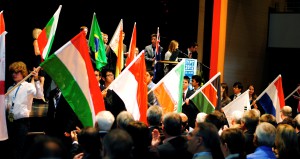
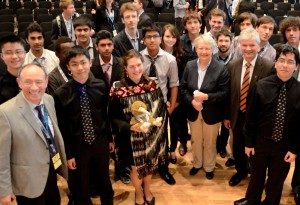
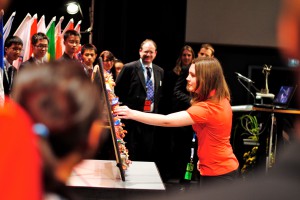
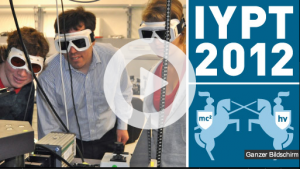
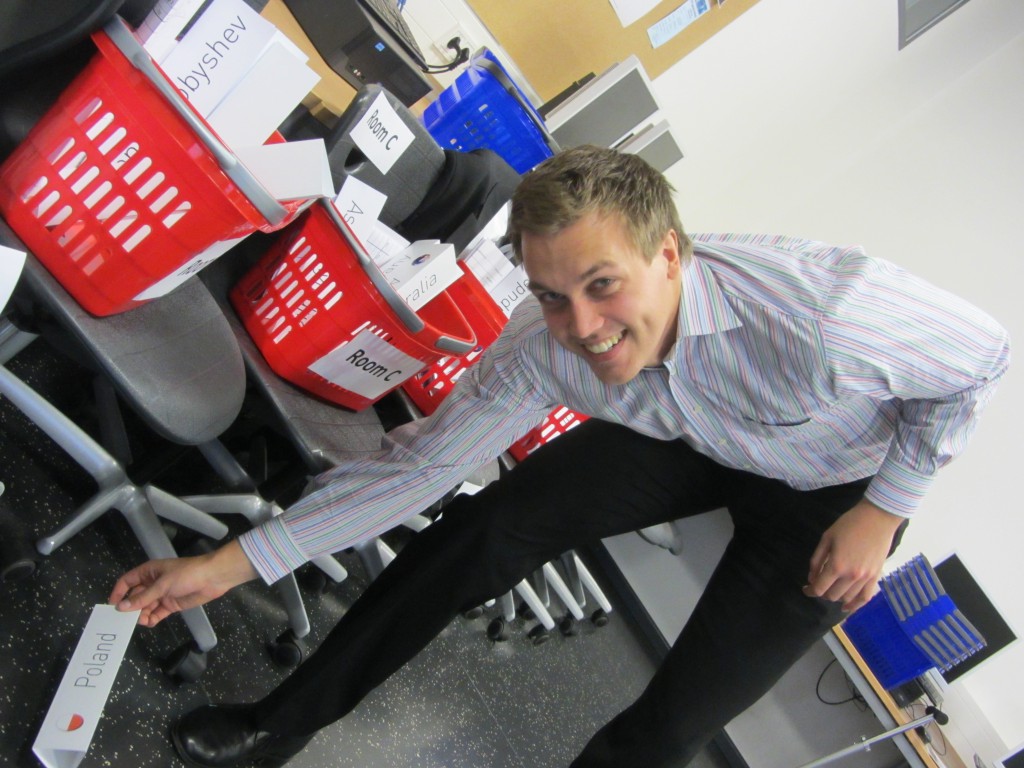
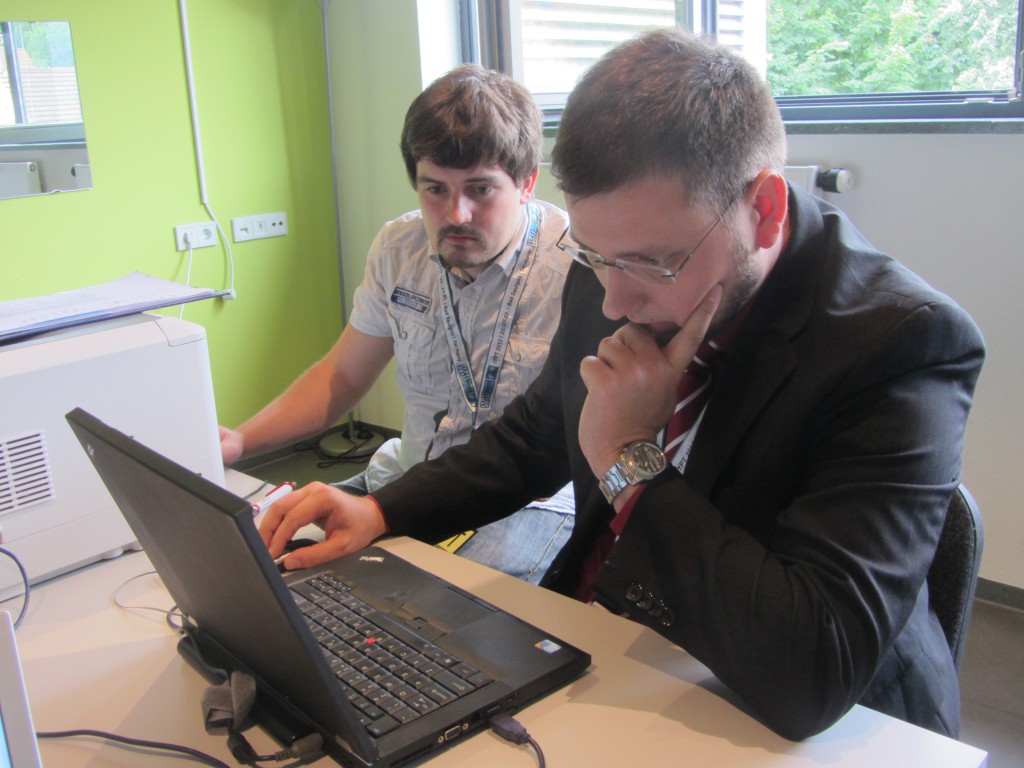 blog
blog